 07/11/2008 18:07 07/11/2008 18:07 |
|
| | | OFFLINE | Post: 3.409 | Registrato il: 23/11/2005
| Utente Master | |
|
 Posted earlier today (11/7) by Benefan in the preceding page
Posted earlier today (11/7) by Benefan in the preceding page:
Reaching across the religious divide - The BBC story on the Catholic-Muslim seminar that just ended.
Holocaust survivors to lobby Vatican embassies around the world against Pius XII beatification -
American group spearheading the movement.
* * * * * * * * * * * * * * * * * * * * * * * * * * * * * * * * * * * * * * * * * * * * * * * * * * * * * * * * * * * * *
Pope slams human organ trade, warns on transplants
Fri Nov 7, 2008 11:25am EST
VATICAN CITY (Reuters) - Pope Benedict condemned the trade in human organs as an abomination Friday and urged caution in removing organs for transplant from dying donors who might not actually yet be dead.
The pontiff told scientists and bioethicists meeting at the Pontifical Academy for Life that the worldwide illegal organ trade often made victims of innocent people, including children.
Buying and selling of human organs is a lucrative business for suppliers and countries that allow foreign "transplant tourists" to have operations they cannot get at home. Organs are often bought from poor peasants and sometimes harvested from condemned prisoners.
"Abuses in transplantation and organ trafficking, which often hit innocent people such as children, ... should be decisively condemned as abominations," he said.
Benedict called legal organ donation an act of love and said there were long waiting lists for vital organs to save lives.
Science has helped to better determine the moment of death, he said, and scientists should push to make this even more precise.
"There must not be the slightest suspicion of arbitrariness. Where certainty cannot be achieved, the principle of precaution must prevail," he said.
Health officials estimate about 10 percent of transplanted kidneys worldwide are illegally obtained. The rest come from brain dead donors or people donating an organ for a relative.
In his speech, Benedict did not discuss the Church's guidelines for determining death, which some Catholic bioethicists want to narrow because of reported abuses.
A recent article in the Vatican daily L'Osservatore Romano challenged the medical consensus that brain death marks the death of a person. Since the brain can die before other organs, this allows doctors to harvest organs for transplant.
The Vatican article came after the New England Journal of Medicine reported doctors in Denver had taken hearts from 3 brain-damaged infants within 75 to 180 seconds after their cardiac deaths and then successfully implanted and restarted them in other babies.
The Vatican has long accepted the brain death criterion. Rejecting it now could force Catholic hospitals to revert to the cardiac death rule, leaving many fewer organs for transplant.
Rev. Federico Lombardi, the Vatican's chief spokesman, said when the article appeared in September that it did not mean a change in Church policy.
(Reporting by Tom Heneghan; Editing by Catherine Bosley)
[Modificato da TERESA BENEDETTA 07/11/2008 23:30] |
|
 07/11/2008 18:15 07/11/2008 18:15 |
|
| | | OFFLINE | Post: 3.411 | Registrato il: 23/11/2005
| Utente Master | |
|
An open letter to President-elect Barack Obama
All Things Catholic by John L. Allen, Jr.
National Catholic Reporter
Friday, November 7, 2008 - Vol. 8, No. 7
For the record, nobody from the Obama transition team has solicited my advice about relations with the Vatican, and I would frankly be surprised if the question were yet on their radar screen. Others, however, are already speculating about how things might shake out; on Wednesday, for example, Reuters moved a story predicting a “tricky” relationship between Rome and the Obama White House because of the abortion issue. As a thought exercise, I decided to pen an open letter to the president-elect about U.S.-Vatican ties over the next four years.
Mr. President-elect:
This letter is a plea to make U.S.-Vatican relations under your administration a priority, because of the enormous good in the world that could be accomplished by exploiting natural areas of common concern.
I’m aware that the stars may not seem especially well-aligned for such collaboration. A small number of Catholic bishops in the United States made statements during the campaign that favored your opponent, which may have left a bitter aftertaste among some of your supporters and advisors. It’s also clear to everyone that, barring a dramatic change of heart on your part, the White House and the Vatican will have deep differences during your term over “life issues” such as abortion and embryonic stem cell research.
I would urge you, however, not to allow those points to obscure four basic political realities.
First, the Vatican and the United States need each other, whatever their differences may be in a given historical moment. What the United States is in the realm of “hard power,” meaning coercive military and economic might, the Vatican is in terms of “soft power,” meaning the capacity to stir action on the basis of ideas. Religion is a powerful motivating force in human affairs, and the pope has the biggest bully pulpit of any religious leader. It’s simply bad for everyone if these two forces are not on good speaking terms.
Second, it’s smart politics for you not to neglect the Vatican. As you know better than anyone, in some ways your reelection campaign in 2012 has already begun. You won the Catholic vote overall this time, but narrowly lost white Catholics; working cooperatively and respectfully with the Vatican could help you and your party with that group.
Third, the Vatican has a centuries-old diplomatic tradition of dealing with governments that, in one way or another, don’t follow the church’s line on certain matters. Despite those disagreements, Vatican diplomacy typically strives to keep lines of communication open and to seek common ground. In other words, they’ll want to do business with you where they can.
Fourth, the Vatican is eager for good relations with the United States in particular, regardless of which party happens to be in power. The Vatican deeply admires the robust religiosity of America, in contrast with the pervasive secularism of much of Europe. The Vatican also believes that the United States is its most natural ally in promoting religious freedom and human dignity around the world.
The potential for collaboration is very real, because there are numerous areas where your policy positions dovetail with the social teaching of the Catholic church and the diplomatic interests of the Vatican. Among the most obvious examples are immigration, economic justice, peace, and environmental protection. In a statement this week congratulating you, Vatican spokesperson Fr. Federico Lombardi also expressed the Vatican’s desire to work together on Iraq, the Holy Land, Christian minorities in the Middle East and Asia, and the fight against poverty and social inequality.
In each area, you will find a clear track record of teaching from recent popes and a strong determination on the part of the Vatican’s diplomatic apparatus to move the ball. In fact, many of these topics represent areas in which the Vatican was at odds with the Bush administration and has longed for new American leadership.
Pope Benedict XVI himself has clearly opened the door to a positive working relationship.
The pope sent a telegram on Wednesday calling your election “a historic occasion,” and offering his prayer that God will “support you and the American people, so that through the good will of all, a world of peace, solidarity and justice can be built.” Lombardi likewise expressed hope that you “will be able to match the expectations and the hopes directed towards the new president, effectively serving justice and rights, finding the best ways to promote peace in the world, favoring the growth and dignity of persons with respect for essential human and spiritual values.”
You’ll notice that neither the pope nor his spokesperson explicitly mentioned abortion or other areas of disagreement, and certainly their tone suggests that concern for the “life issues” will not exclude cooperation in other areas. On the contrary, the Vatican seems to be doing everything it can to invite it.
May I suggest one more possibility for U.S.-Vatican partnership? I believe there is a historic opportunity for your administration and the Holy See to work together to move the international community, at long last, toward serious engagement on behalf of peace and development in Africa.
You are a hero to much of Africa, giving you a degree of political capital on the continent that no other Western leader could rival. At the same time, 2009 is shaping up as a “Year of Africa” in global Catholicism. Over the next 12 months, Pope Benedict XVI will visit Cameroon and Angola; the African bishops will hold their plenary assembly in Rome; and bishops from all over the world will converge on Rome for a “Synod for Africa.” All this suggests the possibility of synergy between the world’s most important political and spiritual leaders -- i.e., you and the pope -- to promote peace and development for Africa, where the world’s most impoverished and abandoned people are today found.
If you’re interested in forging such a partnership, the first important choice to make is who to send to the Vatican as your ambassador. Ideally, you will turn to someone known to have your ear, who will have real political influence in your administration, and who also knows the Catholic world. What you’re looking for, in other words, is a Democratic equivalent of James Nicholson, President Bush’s first Vatican ambassador. Nicholson had served as the chair of the Republican National Committee, and helped to steer the party’s outreach to Catholic voters. Bush sent a clear signal with that nomination that he was interested in the Vatican, and this is one case where it would behoove you to follow his lead.
Finally, one last piece of unsolicited advice: Mr. President-Elect, whatever else you do, please try to avoid repeating the mistakes of the last Democratic administration with regard to the Vatican.
In his memoirs, former Vatican Ambassador Raymond Flynn tells a depressing story from 1994 illustrating what I mean. During the lead-up to the U.N. conference on population in Cairo in 1994, Pope John Paul II called Flynn to the Vatican on a Saturday morning to personally request a telephone conversation with President Clinton. Flynn relayed the request urgently to the White House that afternoon, and got no response. He called again on Sunday and on Monday, both times with no results. Frustrated, Flynn then got on a plane to Washington on Tuesday. He cooled his heels outside the president’s office that night and most of Wednesday. Finally, he was admitted to the White House’s pre-Cairo war room, where he was told by Assistant Secretary of State Timothy Wirth that “nobody is getting a chance to lobby the president on this one.” Dumbfounded, Flynn explained that the Bishop of Rome is not a lobbyist, and that it would be seen as a profound act of disrespect if the president wouldn’t even get on the phone. After almost a week, Clinton finally agreed to take the pope’s call.
The episode was symptomatic of a basic disinterest within the Clinton team about the Vatican, which at times shaded off into hostility. The result was that the U.S.-Vatican relationship during the Clinton years was more often defined by predictable differences than by imaginative areas of common purpose.
For what it’s worth, Mr. President-Elect, my advice is to get on the phone if the pope calls. Better yet, initiate the conversation yourself. You might be surprised about where it goes.
|
 07/11/2008 19:29 07/11/2008 19:29 |
|
| | | OFFLINE | | Post: 95 | Registrato il: 16/07/2007
| Utente Junior | |
|
John Allen's "Open Letter" Here is my response to his letter:
Mr. Allen,
With all due respect, I think you have misstated a few things in this letter.
The fact that Pope Benedict sent a note of congratulations to Senator Obama, calling it a "historic occasion" is absolutely correct. But this does not, in any way, indicate that the Pope approves of or supports Mr. Obama's already-expressed vision or policies. Clearly, the Pope will work with Mr. Obama insofar as he can, perhaps especially on Africa, but I'll be very "surprised" if his relationship with Mr. Obama is either warm or enduring. If you think that the Pope will allow himself to be used to shore up Obama's base with Catholics, you yourself are off-base. Doctrine does count, after all.
Second, the "robust religiosity" of America that you cite is more apparent than real. Aside from the collapse of the mainline Protestant bodies and the erosion in the Catholic Church, I think what you're referring to, without being explicit, is the oft-cited strength of evangelical Protestantism. Well, if their strength was in evidence during this election cycle, I didn't see it. Either they sat on their hands or their "principles" were as up-for-grabs as anyone else's. Religiosity requires more than putting on a good show.
|
 07/11/2008 23:24 07/11/2008 23:24 |
|
| | | OFFLINE | | Post: 15.600 | Registrato il: 28/08/2005
| Utente Gold | |
|

OR for 11/7/08:
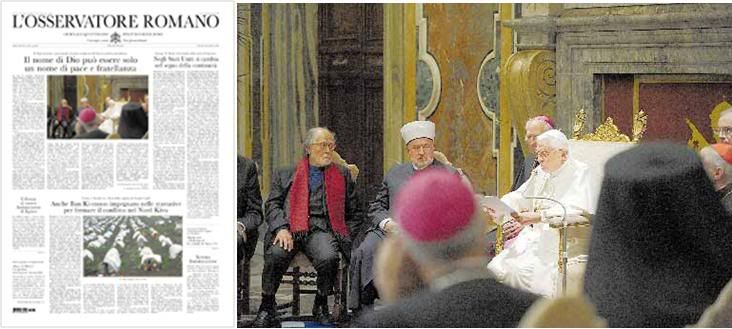
Benedict XVI to the participants of the Catholic-Muslim Forum seminar:
'The name of God can only be a name of peace and brotherhood'
 Other Page 1 stories: The Pope receives the new lady Ambassador of Egypt (above, right photo); an editorial commentary on the political change in the United States 'in the sign of continuity' gives primary play to President Bush's Rose Garden speech praising his successor's historic achievement and promising a smooth transition; UN secretary-general gets involved in the negotiations to end the conflict in the Democratic Republic of Congo's North Kivu region.
THE POPE'S DAY
Other Page 1 stories: The Pope receives the new lady Ambassador of Egypt (above, right photo); an editorial commentary on the political change in the United States 'in the sign of continuity' gives primary play to President Bush's Rose Garden speech praising his successor's historic achievement and promising a smooth transition; UN secretary-general gets involved in the negotiations to end the conflict in the Democratic Republic of Congo's North Kivu region.
THE POPE'S DAY
The Holy Father met Friday with
- H.E. Vytautas Ališauskas, Ambassador from Lithuania, who presented his credentials. Address in English.
- Bishops of Bolivia, Group 2, on ad-limina visit
- Participants of an International Congress on organ donation organized by the Pontifical Academy for Life.
- Cardinal William Levada, Prefect of the Congregation for the Doctrine of the Faith (regular meeting).
LITHUANIA: CULTIVATING
THE MEMORY OF HISTORY

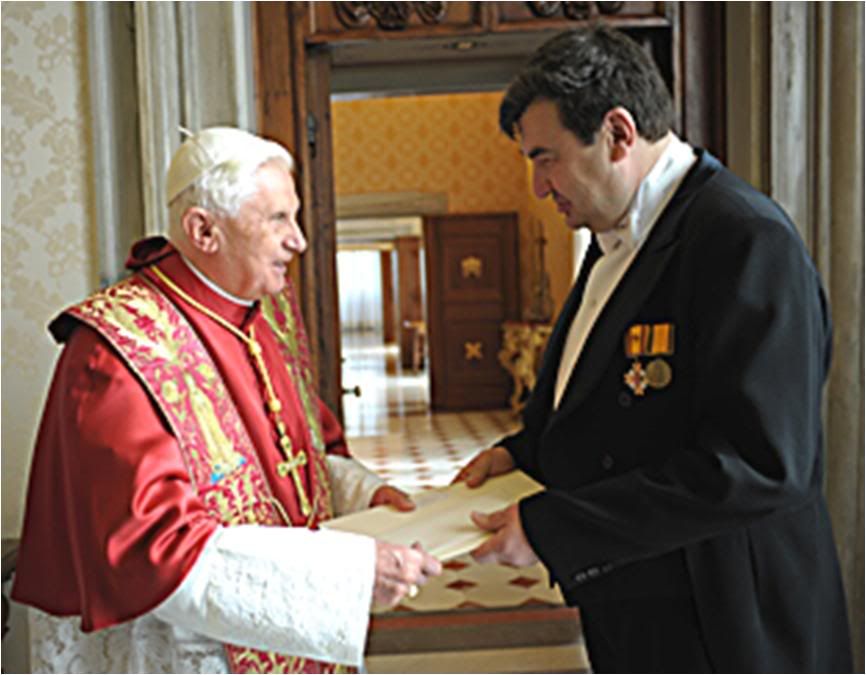
VATICAN CITY, 7 NOV 2008 (VIS) - Benedict XVI today received the Letters of Credence of Vytautas Alisauskas, the new ambassador of Lithuania to the Holy See.
Speaking IN English, the Pope thanked the ambassador for his comments "concerning the need for modern Europe to draw upon the tradition that flows from the teaching of the Gospel", and he recalled how "in recent centuries, the faith of the Lithuanian people has sustained them through periods of foreign domination and oppression, and has helped them to preserve and consolidate their identity.
"Now that the Republic has regained its independence", he added, "it can offer moving testimony to the values which enabled its people to survive those difficult years. ... Communities that have lived under such circumstances acquire a deep conviction that true happiness is to be found in God alone. They know that any society which denies the Creator inevitably begins to lose its sense of the beauty, truth and goodness of human life".
The Holy Father noted how a generation has grown up in Eastern Europe "which did not share in that experience of totalitarian government, and tends therefore to take its political freedom for granted."
"In consequence of this", he said, "there is a risk that some of the fruits which matured in testing times may begin to be lost... Today's society, although free, suffers increasingly from fragmentation and moral confusion. In this context, it is vitally important that Lithuania, and indeed the whole of Europe, cultivates the memory of the history that shaped it, in order to preserve its true identity and thus to survive and flourish in the world of the 21st century".
The Holy Father proceeded:
"It is both a paradox and a tragedy that in this era of globalisation, when the possibilities of communication and interaction with others have increased to a degree that earlier generations could scarcely have imagined, so many people feel isolated and cut off from one another.
"This gives rise to many social problems which cannot be resolved on the political plane alone. ... The Church has a vital part to play here" because "she seeks to build a civilisation of love. ... Since 'love of God leads to participation in the justice and generosity of God towards others', the practice of Christianity leads naturally to solidarity. ...
"It leads to a determination to serve the common good and to take responsibility for the weaker members of society, and it curbs the desire to amass wealth for oneself alone. Our society needs to rise above the allure of material goods, and to focus instead upon values that truly promote the good of the human person".
Lithuania and the Holy See can work together, said Pope Benedict, "to forge a Europe in which priority is given to the defence of marriage and family life, to the protection of human life from conception to natural death, and to the promotion of sound ethical practices in medical and scientific research: practices which are truly respectful of the dignity of the human person. We can promote effective solidarity with the poor, the sick, the vulnerable, and all those on the margins of society.
"These values will strike a chord with all those, especially the young, who are seeking answers to their profound questioning about the meaning and purpose of life. They will resonate with all who are anxious to discover the truth that is so often obscured by the superficial messages propagated by post-modern society. They will appeal to all who are discriminating enough to reject the world-view built upon relativism and secularism, and who aspire instead to live in a manner befitting the true nobility of the human spirit".
ORGAN TRANSPLANTS AND
RESPECT FOR HUMAN DIGNITY

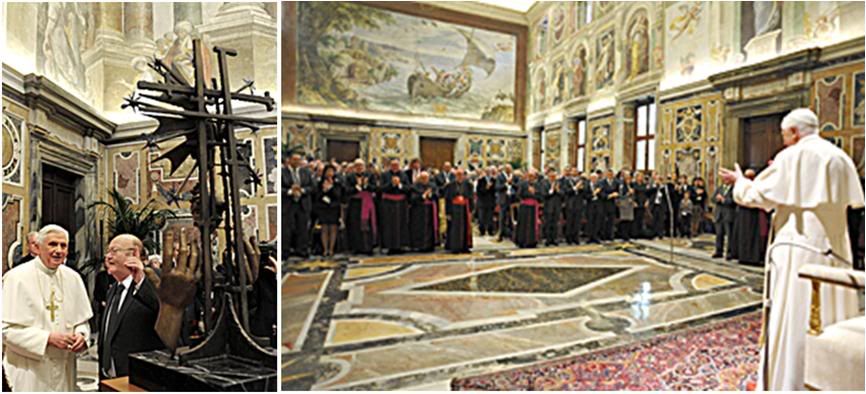
The Holy Father today met participants in an international congress entitled: "A Gift for Life. Considerations on Organ Donation".
The meeting is being held in Rome from Nov. 6-8, organised by the Pontifical Academy for Life, in collaboration with the International Federation of Catholic Medical Associations and the National Transplant Centre.
Here is a full translation of the Holy Father's text:
Venerated brothers in the Episcopate,
Distinguished ladies and gentlemen:
Organ donation is a special form of charity. In a time like ours, often marked by various forms of selfishness, it becomes ever more urgent to understand how determinative it is for a correct concept of life to enter into the logic of gratuity - giving freely.
In fact, there is a responsibility of love and charity which would have one make a gift of one's own life for others if one wants to realize himself. As our Lord Jesus taught us, only he who gives his own livf can save it (cfr Lk 9,24).
In greeting all who are present, with a special thought for Senator Maurizio Sacconi, Minister of Labor, Halth and Social Policy, I thank Archbishop Rino Fisichella, president of the Pontifical Academy for Life, for the words he addressed to me, for illustrating the profound importance of this meeting, and for presenting a summary of what the congress has done so far.
I join him in thanking the president of the International Federation of Catholic Medical Associations and the director of the National Transplant Center (of Italy), underscoring my appreciation for the value of the collaboration between these organizations in a field like that of organ transplantation which has been the object, distinguishd ladies and gentlemen, of your study and discussions in the past few days.
The history of medicine evidently shows the great advances that have made it possible to allow a life that is more worthy for every person who suffers. The transplantation of tissues and organs represents a great conquest of medical science and is certainly a sign of hope for so many persons who are in grave and often extreme clinical conditions.
If we extend our look worldwide, it is easy to identify so many complex cases in which, thanks to the technique of organ transplantation, many persons have overcome highly critical phases and have been restored to the joy of living.
This could never have happened if the commitment of physicians and the competence of researchers had not been able to count on the generosity and altruism of those who have donated organs.
The problem of availability of vital organs for transplantation, unfortunately, is not theoretical but tragically practical. This can be verified in the long waiting lists for so many sick persons whose only chance of survival is linked to scarce offerings that do not correspond to actual need.
It is useful, especially in today's context, to reflect back on this scientific conquest so that the multiplication of requests for transplants does not lead to subverting basic ethical principles.
As I said in my first encyclical, the body can never be considered as a mere object (cfr Deus caritas est, No. 5); otherwise, the logic of the market would prevail.
The body of every person, together with the soul which is given singularly to each one, constitute an inseparable unity on which is impressed the image of God himself. To do away with this dimension would lead to perspectives that are incapable of grasping the totality of the mystery in every single human being. Therefore, it is necessary, to consider, above all, respect for the dignity of the individual and protection of his personal identity.
As for organ donation itself, it means that one can donate only if one's own health and identity are not placed in serious danger, and that it is done for a morally valid and proportionate reason.
The eventual logic of a market for organs, as well as the adoption of discriminatory or utilitarian criteria, would be so stridently against the underlying significance of organ donation that they should be considered out of the question as being morally illicit.
The abuses in organ transplants and trafficking in organs - which usually affect innocent persons including children - should find the scientific and medical community promptly united in rejecting these as unacceptable practices. Indeed, they must be condemned as abominable.
The same ethical principle must be applied when it concerns the creation and destruction of human embryos destined for therapeutic purposes. The very idea of considering the embryo as 'therapeutic material' contradicts the cultural, civil and ethical bases on which the dignity of the human being rests.
It often happens that organ transplantation is made possible by a gesture of complete gratuity by the relatives of patients whose death has been ascertained. In such cases, informed consent previously given [by the donor patient] must be a pre-condition so that the transplant has the characteristic of a gift and cannot be interpreted as a coercive or exploitative act.
It is useful to remember, nonetheless, that single vital organs cannot be taken except ex cadavere, from a dead body, which still has a dignity that must be respected.
In recent years, science has achieved further advances in ascertaining when a patient is dead. It would be good if such results receive the consensus of the entire scientific community in order to favor solutions that can assure certainty for all concerned.
In a field such as this, in fact, there cannot be the least suspicion of arbitrariness, and where certainty has not been reached, the principle of caution must prevail.
For this, it is useful that research and inter-disciplinary reflection be increased so that public opinion may be presented with the most transparent truth on the anthropological, social, ethical and juridical implications of organ transplantation.
In these cases, nonetheless, the principal criterion should be respect for the donor's life, so that removing an organ is only done after real death (cfr Compendium of the Catechism of the Catholic Church, No. 476).
The act of love that is expressed in donating one's own vital organs endures as a genuine testimonial of charity which can look beyond death so that life may triumph.
The recipient should be very conscious about the value of such a gesture. He is the beneficiary of a gift that goes beyond therapeutic benefit. What he receives, in fact, is not just an organ, but primarily a testimonial of love which should inspire an equally generous response, thus enriching the culture of giving and gratuity.
The master path to follow - until science can discover new and more progressive forms of therapy - should be the formation and diffusion of a culture of solidarity which is open to all and does not exclude anyone.
Transplantation medicine corresponding to an ethic of donation demands from everyone a commitment to invest every possible effort in formation and information, in order to increasingly sensitize consciences to a problem that directly invests the lives of so many persons.
It will be necessary, therefore, to avoid prejudices and misunderstandings, to dissipate suspicions and fears, and replace these with certainties and guarantees that will allow the growth in everyone of an ever broader consciousness of the great gift of life.
With these sentiments, and while I wish each one to continue in your own task with the necessary competence and professionalism, I invoke the aid of God on the work of the Congress, and impart my benediction to all from the heart.
Pope sends condolences
for Mexican plane crash

VATICAN CITY, NOV. 7, 2008 (Zenit.org).- Benedict XVI sent his condolences to Mexico upon hearing of a tragic plane crash in the nation's capital that claimed the life of a top presidential aide and eight other government officials.
Interior Secretary Juan Camilo Mouriño was among the 9 passengers, including the pilot, who died Tuesday when a small government plane lost control and crashed in the middle of Lomas de Chapultepec neighborhood of Mexico City during rush hour. Five others on the ground were killed, and at least 40 were injured.
Mouriño, 37, was appointed in January to head up the nation's battle against drug cartels.
In a letter addressed to Mexican President Felipe Calderón, sent through the Pope's secretary of state, Cardinal Tarciso Bertone, the Pope extended "to all the families and to the Mexican nation his heartfelt condolences, as well as he fatherly closeness."
"His Holiness will offer intercessory prayers for the eternal rest of the fallen and prays to the Lord for the rapid recovery of those who were hurt."
[Modificato da TERESA BENEDETTA 10/11/2008 07:29] |
 08/11/2008 00:15 08/11/2008 00:15 |
|
| | | OFFLINE | | Post: 15.601 | Registrato il: 28/08/2005
| Utente Gold | |
|
 Some of the background information provided by Fr. Samir in this article soMEwhat allays my concern about the seeming hypocrisy of the Final Declaration when it refers to those universal principles that are generally violated in most Muslim states
Some of the background information provided by Fr. Samir in this article soMEwhat allays my concern about the seeming hypocrisy of the Final Declaration when it refers to those universal principles that are generally violated in most Muslim states.
Behind the scenes
at the Christian-Muslim seminar
by Samir Khalil Samir, SJ

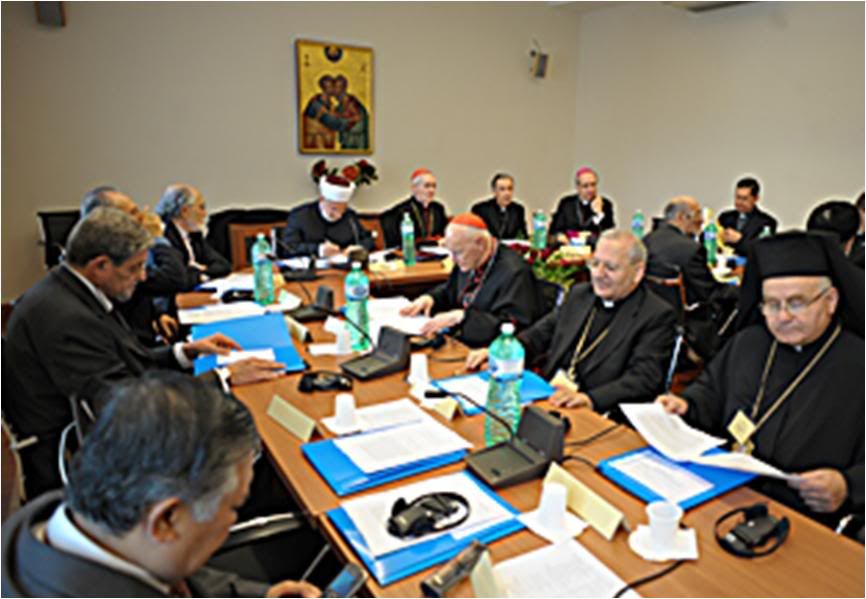
Vatican City, Nov. 7 (AsiaNews) – After many years of difficulty, what took place in the Vatican between November 4th and 6th, was the first Christian-Muslim encounter on a worldwide stage.
The group of Muslims hailed from the Arab world, from Africa, America: converted imams from the Western world were among the participants as well as imams from the Far East (Indonesia, Malaysia, etc..).
Catholic members too were drawn from across the continents. The Council for Inter-Religious Dialogue had deliberately wanted this heterogeneous mix. Both sides also had women members.
The most important element that needs to be underlined was the atmosphere of serenity and friendship, respected at all times, both in public and in private one-on-one encounters.
On occasion there were moments of tension, but they were truly rare. This atmosphere was the direct result of the leadership of the Mufti of Sarajevo, Mustafa Cerić, and Cardinal Tauran, both of whom have always insisted on talking "as friends, as brothers”.
The program also helped: each day there were 2 brief interventions, Christian and Muslim, each lasting 30 minutes in a parallel. This allowed listeners to perceive the two viewpoints that are distinct, but trying to find common ground.
For the remainder of the day there were other interventions and questions and answer sessions between the two delegations. This meant that for over 5 hours there was the time to exchange opinions and points of view.
All involved were careful of and adherent to the rules and form of the interventions. Even during lunch we mixed freely. In short it all took place in an atmosphere of informal brotherhood and true friendship.
Another point that must be highlighted is the quality and seriousness of the participants, who were of the highest level from both a spiritual and intellectual point of view. This gave a stamp of great seriousness to our dialogue.
The western Imams, who had converted to Islam, had a very broad culture, both of the Islamic world and of the Christian world, with knowledge of medieval sources and of Saint Thomas Aquinas.
The address delivered by Seyyed Hossein Nasr [Iranian philosopher and professor in the USA] for example was truly superb. It greatly contributed to a fruitful and serene dialogue.
Some may claim that the final document (see Catholic-Muslim joint declaration) is too generic. But we must take into account that this is the first in a series of meetings. What is most important about this Forum is that it is a start.
Points 14 and 15 of the Declaration affirm that this is the beginning of a process and that within the next two years we will have to hold another meeting in a Muslim nation yet to be decided on. This means that a slow, but continuous process has begun that may increasingly bear fruits and draw the two communities closer.
The difficulties
Dialogue was frank: we did not shy away from difficulties. We had chosen the title “Love of God and Love of Neighbour” for the encounter.
Despite some pressure for more theological and spiritual consideration, there was a general consensus to confront theological questions on the first day; and on the second, the themes of human dignity and reciprocal respect.
Some feared these themes, because they risk raising embarrassing problems, above all for Islam, by involving religious freedom, public witness, mission, etc.
In the end we all agreed to face these themes both on a philosophical level, to ground them in faith, and on a practical level, to suggest some ways they may be applied. This dialogue too was very fruitful.
Moreover, the Muslims themselves highlighted the reticence of the Islamic world to accept concepts such as equality among all men, common dignity, freedom to practice one’s faith, etc…
Some Muslims almost envy European Christians, whose longer and more profound historical journey has led them to the conquest of a distinction between faith and politics; between Church and State, even arriving to the point of wars over this.
“All of these battles", some Muslims observed. "brought your Church to rethink the relationship between Religion and State. We have had fewer problems. But this has not allowed us to deepen the distinction. Then when Europe arrived in our countries, we were unable to absorb this lesson, because Europe entered as an enemy and coloniser, and this hardened positions”.
This seems to me to be a valid analysis, even if somewhat insufficient. The distinction between religion and politics is not just the result of historic struggles, but of principle: it is rooted in the Gospel where Christ refuses to behave like a political or social leader. Whereas the context of the Arab tribes in the VII century pushed Mohammad to make socio-political choices.
This led to an interesting debate on secular society, secularisation and secularism. Many Muslims distinguished between the secular nature of the State which “we Muslims could accept”, and secular in the sense of atheistic secularism “which is to be fought”.
This differentiation is of benefit to all, even for our Western societies that are drowning in practical atheism. Many frequently quoted from (and expressed their appreciation of) the Pope’s position on “a secular society that is open” [to the religious dimension - see The Regensburg Address].
It was above all underlined by the Muslim side that the problem of secularism unites both Christians and Muslims. Churches are emptying, they told us, mosques somewhat less, but membership in a mosque may be just a refuge of self-identification, a need to grasp onto something.
There were theological, philosophical, sociological contributions from both parts, greatly enriching for all involved. The problem of secularisation merits a convention on its own.
From there we passed onto the problem of freedom of conscience and of religion, a very delicate theme which was treated with discretion, and which re-emerged when the moment came to accept the final document.
In the Joint Declaration, “the right of persons and communities to practise their faith in private and in public” emerged in point 5.
Serious problems arose. Some Muslims said: “If you include those words you put us in great difficulty. Freedom of religion in our countries is governed by State law. How can we distribute a document that is against State law? We risk being disqualified and marginalised by our society”. Some Muslims suggested omitting at least the words “in private and in public”.
There was also a formula that defended the right to spread one's own faith such as “Da’wa” (mission for Islam) or Tabshir (Christian mission). But it was held to be too strong and so we eliminated it.
[That's too bad because this is truly essential. It is one of those practical things they might have addressed. What is the dividing line between 'normal' evangelization and 'proselytism? But then, perhaps, it is futile to even raise the question if the Muslim state considers it a crime to even manifest any sign of one's religion if it is not Muslim! It is a question, though, that needs to be straightened out with the Patriarchate of Moscow, in the ecumenical context.]
All of these difficulties were resolved by the Grand Mufti of Bosnia. Mustafa Cerić recalled that the formula on religious freedom used in the joint statement “are those found in the UN Declaration of Human Rights. Many Muslim governments signed this Declaration. Therefore they must accept it, even though perhaps they don’t practise it”. This solved the problem and eased the path for all to adhere to the final document.
Difficulties remain, but at least we have affirmed the principle of freedom. What’s more, in the Koran there are verses which lend support to this position.
The problem of religious freedom also raised the question of how to put the declaration to use. We all agreed to translate it into our own languages and distribute it as much as possible, sensitising our governments too, even though we do not have the power to force them to change their laws.
Another way to render this encounter beneficial is to educate younger generations to be more objective and respectful of other religions, both through scholastic text books and general publications.
All agreed that “we cannot continue to transmit errors". This is why books which speak of Christians should be written by Christians and vice-versa: books which speak of Islam should be written by Muslims and adopted even in Catholic schools”. The theme of education could be the theme of a future Forum appointment.
A common challenge:
modernity without God
In conclusion, the encounter was very positive but it also opened questions that require greater study, for example the question of religious freedom.
Muslim tradition affirms freedom of conscience, but does not guarantee community witness because it sees in the witness of another faith the risk of scandal for the Islamic community, and therefore something to be condemned.
But secularism remains the most urgent question, one which has opened a space for a common mission. In their interventions many Muslims described the secularisation of the world as the most worrying problem that needs to be confronted and this is why they want Catholics to react along with them.
There is a real risk of a fundamentalist vision emerging, in which we ask governments to guarantee religions, but in the end I believe that these demands are honest ones. [Why would it be fundamentalist to do so???]
The underlying problem is an anti-religious modernity. Muslims want to build a modernity that is not anti-religious and that is open to God, as Benedict XVI himself continues to preach.
I had the clear sensation that within the Muslim world there are increased efforts to reach out to Christians.
A factor that pushed for the meeting in the Vatican is the feeling on the Islamic side that we have a common tradition, the so-called Abrahamic tradition.
It should be noted that the Koran recognises both Christianity and Judaism. But while relations with the Jews are in ruins, friendship with the Christians is witnessed to its last sura.
There is also a political reason: today’s world is dominated by the West, which largely has a Christian tradition, and therefore it is worthwhile for Muslims to dialogue with Christians, and above all , with Catholics.
An interesting fact is the “confession” made by a Sunni Muslim who said he felt closer to Catholics then to Protestants “because you and we refer to tradition as a normative value, and because together we represent over a third of the world”.
A final reason is their hope for help from Christians to defend themselves from Islamaphobia. Muslim leaders feel that the world views their religion as a religion of violence, terror, etc.
In the first draft of the Final Declaration there was the word “terrorism”: Muslims wanted it removed and substituted with a more generic word (“violence”) “because people associate terrorism and Islam”.
There is the real risk in today’s world, they feel, for Islam to be totally condemned. The Pope in his discourse clarified that we must be against violence, even that which is carried out in the “name of God”.
Muslims feel they are being attacked by all and accused by all of terrorism. [That's just paranoia. In general, ordinary non-Muslims, who are not bigots, have common sense and know not to generalize .]
One of them said: “I am not Bin Laden. Why are you making me carry the burden of what Bin Laden does?”. [Perhaps because all of them have not denounced specific acts of terrorism as they occur, no matter how grievous as in Madrid, or to take the most egregious case, the kilings of Muslims by other Muslims that are tkaing place almsot daily in Iraq! OK, in fairness, I understand it may be prudence on their part - lest they risk their own life and/or that of their loved ones.]
They all recognise that these attacks do not come from Christians but from the secularised and atheistic world and this is why they are reaching out for the help of Christians.
There is therefore the desire to overcome barriers and quarrels to jointly face the challenge of secularism towards religions.
One Muslim said he no longer accepted the division between “House of Peace (Dar-al-Islam)” and “House of War (Dar al-Harb)”, which reflects a division of the world along political-religious lines and ferments the jihad against the west.
He prefers the definition “House of Witness”: wherever you may be, in the Islamic world or the Western world, what is important is that you witness your faith. [That's very sensible, but orthodox Muslims may well ask him, where in the Quran does ti say that?]
In the end, these Muslims want Muslims and Christians to offer a common witness in the face of rising secularism.
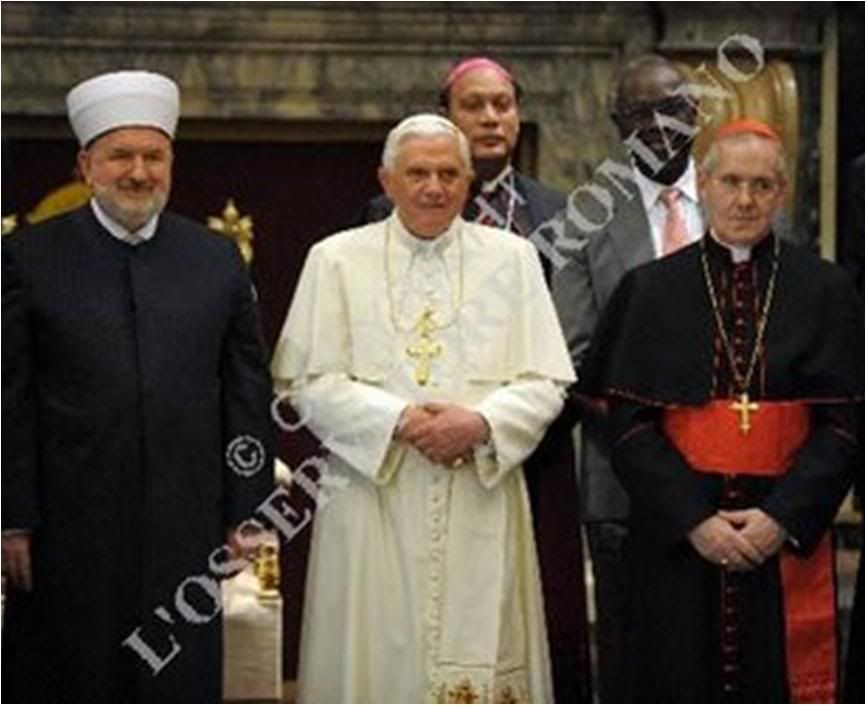 The Holy Father with the Grand Mufti of Bosnia (mwho headed the Muslim panel) and Cardinal Jean-Louis Tauran.
The Holy Father with the Grand Mufti of Bosnia (mwho headed the Muslim panel) and Cardinal Jean-Louis Tauran.
[Modificato da TERESA BENEDETTA 09/11/2008 18:54] |
 08/11/2008 01:44 08/11/2008 01:44 |
|
| | | OFFLINE | | Post: 15.602 | Registrato il: 28/08/2005
| Utente Gold | |
|
 The first presentation of Sandro Magister's book OMELIE on Benedict XVI's homilies delivered in the 2007-2008 liturgical year, took place Wednesday, and I have not posted any of the reports on it because they mostly quoted from Magister's Preface and Cardinal Ruini's presentation - the full texts of which I translated from L'Osservatore Romano which published them in its Wednesday issue.
The first presentation of Sandro Magister's book OMELIE on Benedict XVI's homilies delivered in the 2007-2008 liturgical year, took place Wednesday, and I have not posted any of the reports on it because they mostly quoted from Magister's Preface and Cardinal Ruini's presentation - the full texts of which I translated from L'Osservatore Romano which published them in its Wednesday issue.
The following account, however, also relates what a secular presenter said - he happens to be the president of the group that published the book, but his observations as a lay person are not less interesting than those of Cardinal Runi and Magister himself.
The journalist uses the adjective 'hidden' to refer to the homilies. Some time ago, Magister had written an article about the homilies for www. chiesa, in which he referred to them as the 'secret' messages of the Pope - because only Vatican junkies and Benaddicts usually get to be aware of them!
Ratzinger's 'hidden' treasury
by Carlo Marroni
Translated from

November 7, 2008
The milestones of Joseph Ratzinger's Pontificate so far have become very well-known: his two encyclicals, the book on JESUS OF NAZARETH, and his academic lectures in Regensburg and Paris.
The sum of his theological and pastoral thinking is spreading in the Catholic world, from the evidence of the sales of his works.
But there is another 'production' of Benedict XVI, less known, which clearly delineates the orientation of his thinking and gives additional weight to his liturgical acts - his homilies.
This is a patrimony of Ratzinger that has been called a 'hidden treasury' which has now become more accessible to the public through the book OMELIE: L'anno liturgico narrato da Joseph Ratzinger, papa, published by Libri Scheiwiller, part of the 24 Ore Motta Cultura group.
The book - edited and with a Preface by Sandro Magister, Vaticanista for L'Espresso magazine - puts together 27 homilies and a selection of brief preachings during the Pope's Angelus messages. It was presented Wednesday evening at Palazzo Valdina by the president of the Gruppo 24 Ore, Giancarlo Cerutti; by Cardinal Camillo Ruini, and by thee Minister for Cultural Activities Sandro Bondi.
"The book is unique in its genre," Cerutti said. "It guides us in our search for responses to questions that arise in our daily life.. and in our search for Jesus in today's world."
Cerutti said that his company felt publishing the book was a dutiful contribution "for the development of the Italian nation and to confirm the mission of the Church in the world of culture."
Cardinal Ruini, who knows the Pope well, spoke of his power as a homilist: "The homily is part of the liturgical act, it is liturgy itself, and the Pope is extraordinarily equipped to exercise it."
He recalled that as a theologian, Joseph Ratzinger has always worked to overcome the dualism between exegesis and theology - and in the book, this emerges with clarity, he said.
Both Ruini and Magister said 'simplicity and substance' are the distinguishing characteristics of the Pope's homilies . Magister cited the silence and attentiveness of the faithful when they listen to him.
He also stresses that every homily is clearly written entirely by the Pope himself, as he does most of the other works of his Magisterium, and that, in fact, some of his most effective homilies have been extemporized, most recently the meditation he offered at the opening of the recent Assembly of the Bishops' Synod (which was reported b y the media only for its references to the current global financial crisis and the emptiness of quick profits) [but, it must be added, was a genuine gem of a far-ranging meditation on a Psalm].
Cerutti noted that although Benedict XVI declared himself "a simple and humble worker int he vineyard of the Lord" upon his election, and "has brought us with him through the rows of the vineyard", in his homily last June 29, on the Feast of Saints Peter and Paul, he also said his calling was to be, as St. Paul said of himself, "the liturgist of Christ for the people".
And although the words may seem to refer only to those who hear Mass, Cerutti said, "the Pope, as the pastor that we all would like to have, is capable of reaching the peaks of reason and faith as well as the depths of our heart".
The homilies, he said, "bring to light how Papa Ratzinger interprets his mission: to bring everyone to the faith, to the Word of God, to his Mystery."
Reading through his homilies, Cerutti added, the hallmark of Benedict's Pontificate emerges clearly - the binomial of faith and reason, even in the liturgy, to convey the essence of his message.
"If God is a dialogic unity, a being in relation, then the human creature, made in his image and likeness, would mirror God's constitution: man is called on to realize himself in relationship with others, in dialog, in conversation, in encounter. To be human is to be in a relationship," the Pope said in his homily in Genoa last May.
These are words that leave a trace even in the most simple minds, according to Mons. Gianfranco Ravasi, president of the Pontifical Council for Culture, who said "the Pope's voice is moderate but not empty, substantial but not merely theoretical".
And the Pope is setting the example at a crucial moment for liturgy. The Bishops' Synod on the Word of God was clear: homilies are often boring, too long, and scattershot. Often unclear, and certainly not inspired.
The bishops agreed that the homilies heard in most churches around the world often fail to affect the faithful at all they fail even to try and convey the Word of God as the homily is meant to be.
And so, the Pope's example may be the incentive that can lead priests everywhere to work seriously on their homilies. This new book is an excellent reference for them.
[Modificato da TERESA BENEDETTA 09/11/2008 07:49] |
 08/11/2008 02:53 08/11/2008 02:53 |
|
| | | OFFLINE | | Post: 15.603 | Registrato il: 28/08/2005
| Utente Gold | |
|
Faith and reason in
John Henry Newman
and Joseph Ratzinger
by Luca M. Possati
Translated from
the 11/8/08 issue of

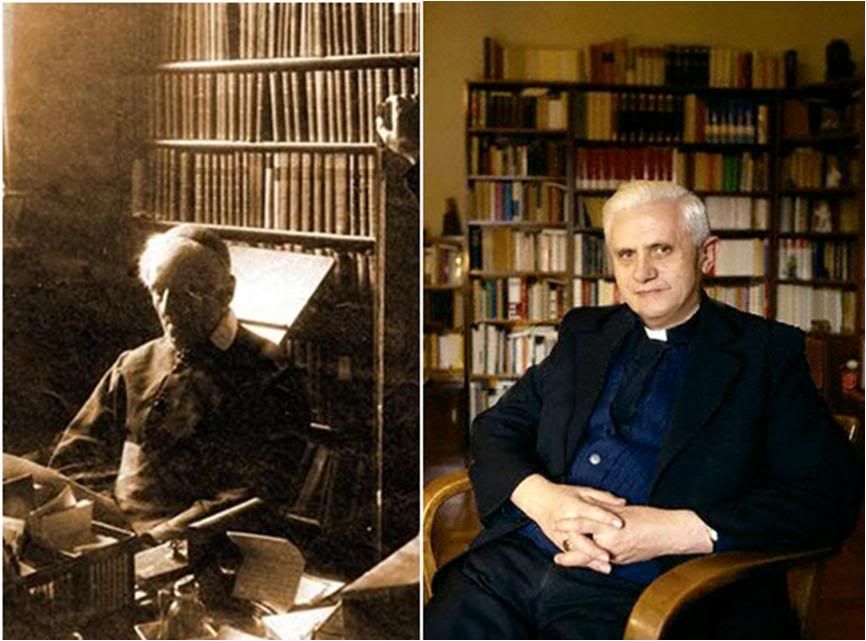
"With all the joy in the face of the possibilities of man, we also see the threats that emerge from these possibilities, and we must ask ourselves how we can master them. We will succeed only if reason and faith are joined in a new way."
It was on September 12, 2006. when Benedict XVI said these words at the University of Regensburg, re-evoking the need to rediscover the 'friendship' between faith and reason, defined as that "internal coherence of the cosmos" superior to any skepticism - the authentic goal of any critique of modern rationality that is not negative or destructive, but rather capable of introducing a widening of the concept of reason itself, within which to recover man's aspiration to the truth and therefore, the rationality of faith."
In this urgency, Benedict XVI clearly indicates a continuity in his thinking that is profoundly in tune with another great philosopher and theologian whom he himself has described as a 'model', a 'great teacher of the Church' - the English Cardinal John Henry Newman (1801-1890).
Because of the importance of such a dialog between faith and reason for the Church today, its immense usefulness in facing the challenges of what we now call post-modernity - above all, by nihilism and relativism, with all their social, political and ethical repercussions - the International Center of the Friends of cardinal Newman organized a "Faith and Reason' symposium in Rome this eek in the presence of many academic and ecclesiastical authorities, among them Lorenzo Ornaghi, rector of the Catholic University of the Sacred Heart and Mons, Georg Gaenswein, the Pope's private secretary and former canon law professor at the Pontifical University of the Holy Cross.
The main lecture was delivered by Prof. Fortunato Morrone, of the Istituto Teologico Calabro-Catanzaro, on "The urgency of a new friendship between reason and faith, according to John Newman and Benedict XVI".
The question of dialog between faith and reason encompasses man's life itself in its extreme concreteness. Faith is not a series of disparate doctrines to learn by heart, much less sentiment, but rather a movement of one's entire existence. This is very clear in both Newman and Benedict, the professor pointed out.
Faith and reason cannot be in conflict but converge spontaneously toward one truth.
"For Christians," Morrone went on, "the passion for truth comes from the encounter with Jesus Christ, who constitutes the profound sense of our life. Revelation must be received as an inexhaustible spring of truth. Benedict XVI has underscored that the only way we can truly use reason most profitably is with faith, against any distorted use, any application of empty and useless schemes."
Linked by a common familiarity with the works of St. Augustine, both Newsman and Benedict XVI recognize the great possibilities that progress in science has opened for modern man, and that these must not be rejected; that God does not ask man to sacrifice his own reason, but full reason is only achieved when faith and reason speak to each other, in dialog.
Science itself, with its self-imposed purpose of obeying the truth, carries in itself a question that transcends it. [A connective pr transitional passage appears to be missing here.].. Only thus will it be possible to have exchanges among different cultures that can be very fruitful for all of mankind.
"The Pope," said Morrone, "urges us towards as vision that is much more concrete than that of the empiricists. By renouncing the faith, Enlightenment philosophy flattened out reason into sterile scientism, to only that which can be verified experimentally, whereas, on the contrary, the correct use of reason can only lead to faith."
The central subject of Newman in The grammar of assent(1870)was the discovery of a new and wider sense of rationality: is it possible to believe in something one cannot prove? Just as the mind requires perception, so too does faith require conscience, of an interiority as the via maestra - the main pathway - towards the Absolute.
"The centrality of conscience in Newman," wrote Joseph Ratzinger, "comes from the centrality of the concept of truth, and that is the basis on which it can be understood."
For Newman, in fact, "deciding in faith is not different from deciding in reason," Morrone explained, "because faith urges reason to look farther and higher, beyond skepticism".
Against the empiricist vision of Hume - and to avoid not only the opposing drifts towards positivistic materialism and blind fideism - in the secular ideal of tolerance, which does not mean true dialog, but peaceful coexistence and reciprocal support - Newman proposed patient and tenacious digging, hewing to given facts, in order to retrace the roots to which man's itinerary on earth is still anchored - from his earliest consciousness to the most complex forms of intuition, which ultimately project beyond the horizon of the present world.
"Newman considered faith as the origin of the philosophical spirit," Morrone concluded. "Indeed, what can science fear from Christianity, which from the very beginning, presented itself as a religion of the Logos, of Creative Reason, open to all that is genuinely rational?"
Cardinal Ratzinger's famous address to mark the centenary of Cardinal Newman's death in 1990, on the idea of conscience in Newman's thinking, may be read on
www.vatican.va/roman_curia/congregations/cfaith/documents/rc_con_cfaith_doc_19900428_ratzinger-newman...
And if you have not had a chance to watch the Holy Father's reading of the Creation story from Genesis, here's the six-minute clip on YouTube:
www.youtube.com/watch?v=CmpMoLHs4C0
[Modificato da TERESA BENEDETTA 08/11/2008 03:58] |
 08/11/2008 04:53 08/11/2008 04:53 |
|
| | | OFFLINE | Post: 3.412 | Registrato il: 23/11/2005
| Utente Master | |
|
PLANS REVEALED FOR BENEDICT XVI FOUNDATION LAUNCH
Featured Event to Be Lecture on Pope's Theology
MAYNOOTH, Ireland, NOV. 7, 2008 (Zenit.org).- This month's launch of a foundation to promote the thought of Benedict XVI will feature a lecture on the main elements of the Pope's theological writings.
A group of Joseph Ratzinger's former doctoral and postdoctoral students, known as the Schülerkreis (Circle of Students), will gather Nov. 12 in Munich for the first event of the Joseph Ratzinger/Pope Benedict XVI Foundation.
According to a press release sent out by Divine Word Missionary Father Vincent Twomey, a member of the circle, a press conference will be held at midday to explain the foundation's origins and goals.
The official launching ceremony will begin with sung vespers in the chapel of the Catholic Academy in the evening, with the main event to place afterward in the academy's auditorium.
Professor Siegfried Wiedenhofer, one of Ratzinger's former assistants, will deliver a paper entitled “Key Issues in the Theology of Professor Dr. Joseph Ratzinger.” This will be followed by a podium discussion on “Ratzinger as Theologian and Teacher.”
Contributors to the podium discussion, which will also be open to the floor, include Cardinal Christoph Schönborn, the archbishop of Vienna; Auxiliary Bishop Hans-Jochen Jaschke of Hamburg, Germany; Father Twomey; and Michaela Hastetter.
Father Twomey said the plans for the foundation had been "long considered." He added that last August, during a meeting of the circle at Castle Gandolfo, members saw "the time was ripe to realize" the project.
He said the foundation will promote "the study of theology 'in the spirit of Joseph Ratzinger,' with a special emphasis on Scripture, the Fathers of the Church, and fundamental theology, as well as encouraging the study of his own original contribution to theology."
The chairman of the Board of Trustees is Monsignor Michael Hofmann. The president of the foundation is the Salvatorian Father Stephan Otto Horn, one of Ratzinger’s assistants in Regensburg.
The Board of Regents is under the chairmanship of Cardinal Schönborn.
|
 08/11/2008 18:49 08/11/2008 18:49 |
|
| | | OFFLINE | | Post: 15.606 | Registrato il: 28/08/2005
| Utente Gold | |
|

OR today.
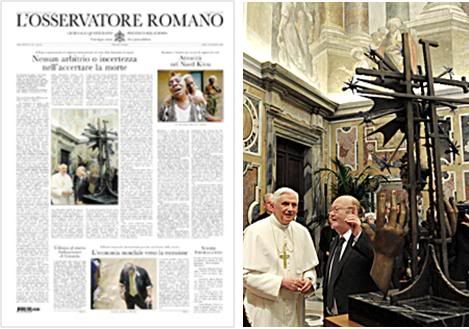 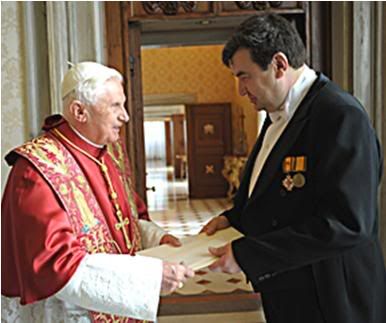
Benedict XVI tells participants of an international congress on organ donation:
'There must be no arbitrariness nor uncertainty in verifying death'
Other Page 1 stories: The Pope receives the new ambassador from Lithuania (right photo); atrocities in the Congo's North Kivu region,
as African leaders meet in Nairobi seeking to prevent worsening of the crisis; and the global economy heads towards recession.
THE POPE'S DAY
The Holy Father met today with
- H.E. Wang Larry Yu-yuan, Ambassador from the Republic of China (Taiwan), who presented his credentials.
Address in English.
- Mons. Vernon James Weisgerber, Archibshop of Winnipeg (Canada), president of the Canadian bishops'
conference, with the vice-president and secretary-general of the conference.
- Bishops of Bolivia (Group 3) on ad-limina visit.
- Mons. Mieczysław Mokrzycki, Archbishop of Lviv of the Latins
- Participants in a conference sponsored by the Pontifical Gregorian and Lateran Universities on the
50th anniversary of the death of Pope Pius XII
I the afternoon, he met with
- Cardinal Giovanni Battista Re, Prefect of the Congregation for Bishops (weekly meeting).
Benedict XVI praises Taiwan
for upholding religious freedom
 Since VIS does not work on weekends, and the Holy Father's address to the new ambassador from Taiwan, Wang Larry Yu-yuan, is fairly brief, here is the entire text, which was delivered in English:
Since VIS does not work on weekends, and the Holy Father's address to the new ambassador from Taiwan, Wang Larry Yu-yuan, is fairly brief, here is the entire text, which was delivered in English:
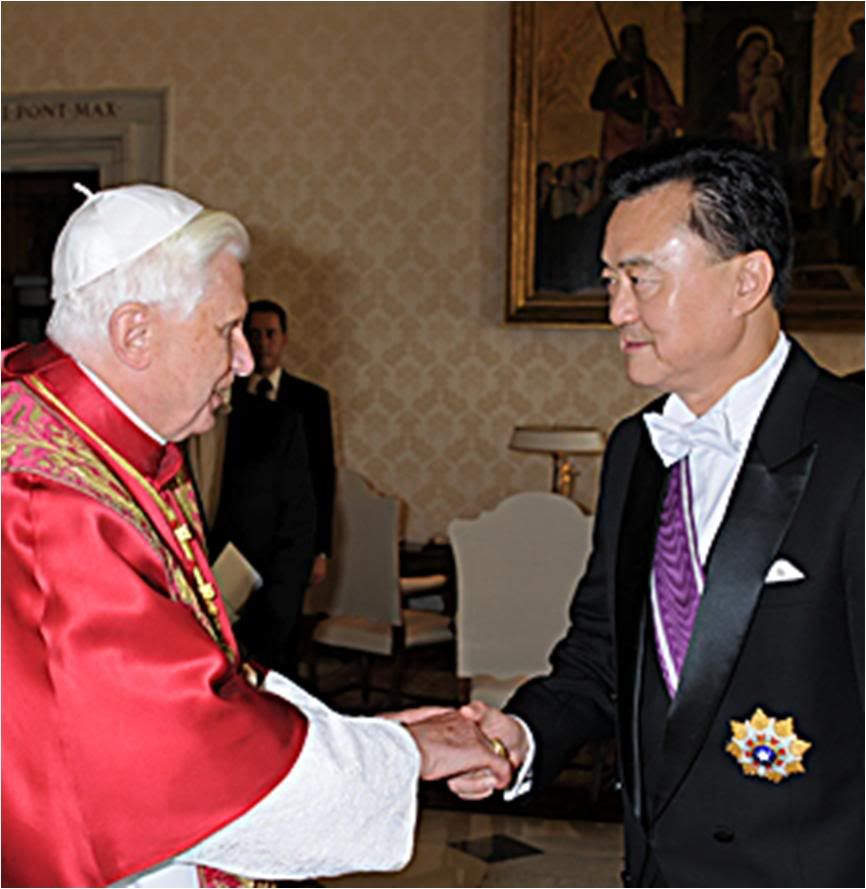
Your Excellency,
I am pleased to welcome you at the start of your mission and to accept the Letters accrediting you as Ambassador Extraordinary and Plenipotentiary of the Republic of China to the Holy See.
I thank you for your kind words and for the greetings you bring from President Ying-jeou Ma. Please convey to him my cordial good wishes on his recent election, as well as the assurance of my prayers for him, the first Catholic to be elected President of the Republic, and for all the people in Taiwan.
The Government in Taipei has a keen sense of belonging to a world community, a global human family. This is expressed in many ways, not least in the generosity with which aid and emergency relief is supplied to poorer nations.
In this regard, your country makes a valuable contribution to the building of a more secure and stable world. The Holy See is pleased to work together with all those who seek to promote peace, prosperity and development, and appreciates the Republic of China’s commitment to that noble cause.
Although Catholics in the Republic of China represent little more than one per cent of the population, they are eager to play their part in building up a society that is humane, just, and marked by genuine concern for the welfare of the weaker members of the community.
It is part of the Church’s mission to share her "expertise in humanity" with all people of good will in order to contribute to the well-being of the human family. Characteristically, it is in the fields of education, healthc are and charitable assistance that she offers this contribution.
Your Government’s firm commitment to freedom of religion has made it possible for the Church to carry out her mission of love and service, and to express herself openly through worship and the proclamation of the Gospel. On behalf of all the Catholics in Taiwan, I would like to express my appreciation of this freedom that the Church enjoys.
Thanks to their "innate spiritual insight and moral wisdom" (Ecclesia in Asia, 6), there is great religious vitality and capacity for renewal among the peoples of Asia. Hence the ground is particularly fertile for interreligious dialogue to take root and grow.
Asians continue to demonstrate a "natural openness to the mutual enrichment of peoples in the midst of a plurality of religions and cultures" (ibid.). How important it is in today’s world for different peoples to be able to listen to one another in an atmosphere of respect and dignity, conscious that their shared humanity is a bond far deeper than the cultural variations that seem to divide them!
Such growth in mutual understanding offers a much-needed service to society at large. By bearing clear witness "to those moral truths which they hold in common with all men and women of good will, religious groups … exert a positive influence on the wider culture" (Address to Representatives of Other Religions, Washington, 17 April 2008).
Frank and constructive dialogue is also the key to the resolution of the conflicts that threaten the stability of our world. In this regard, the Holy See welcomes the recent positive developments in relations between Taiwan and mainland China.
Indeed the Catholic Church is eager to promote peaceful solutions to disputes of whatever kind, "giving attention and encouragement to even the faintest sign of dialogue or desire for reconciliation" (Address to the General Assembly of the United Nations, 18 April, 2008).
In this way, she wishes to support the efforts of Governments to become "staunch champions of human dignity and courageous builders of peace" (Message for the 2007 World Day of Peace, 16).
Your Excellency, I assure you of my good wishes and prayers for the success of the diplomatic mission which you begin today. At all times you will find that the various departments of the Roman Curia are ready to offer help and support in the fulfilment of your duties.
With sentiments of sincere esteem, I invoke God’s abundant blessings upon you, your family, and all the people in Taiwan.
[Modificato da TERESA BENEDETTA 08/11/2008 19:18] |
 08/11/2008 19:59 08/11/2008 19:59 |
|
| | | OFFLINE | | Post: 15.607 | Registrato il: 28/08/2005
| Utente Gold | |
|
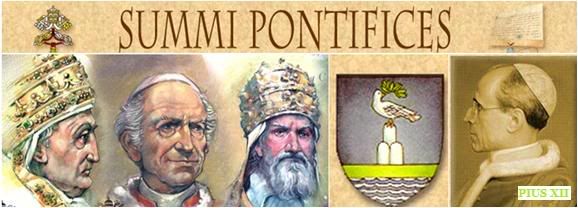 AN INESTIMABLE TEACHING:
AN INESTIMABLE TEACHING:
THE MAGISTERIUM OF PIUS XII
by BENEDICT XVI
Translated from
the 11/9/08 issue of

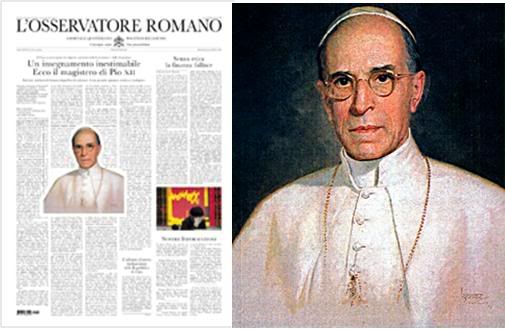 The Holy Father's latest speech on Pius XII gets main play in tomorrow's issue of L'Osservatore Romano.
Here is a translation of the Holy Father's address this morning to participants of a conference on Pope Pius XII organized by the Pontifical Lateran and Gregorian Universities.
The Holy Father's latest speech on Pius XII gets main play in tomorrow's issue of L'Osservatore Romano.
Here is a translation of the Holy Father's address this morning to participants of a conference on Pope Pius XII organized by the Pontifical Lateran and Gregorian Universities.
Eminent Cardinals,
Venerated brothers in the Episcopate end Priesthood,
dear brothers and sisters!
I am pleased to welcome you on the occasion of your congress on "The legacy of the Magisterium of Pius XII and the second Vatican Council", promoted by the Pontifical Lateran University together with the Pontifical Gregorian University.
It is an important congress for the subject chosen and for the erudite persons, coming from various nations, who are taking part.
In extending my greetings to everyone, I particularly thank Mons. Rino Fisichella, Rector Magnificus of the Lateran University, and Fr. Gianfranco Ghirlanda, Rector Magnificus of the Gregorian, for the kind words that they expressed in your behalf.
I appreciate the demanding subject on which you have concentrated your attention. In recent years, when Pius XII has been talked about, attention has been excessively concentrated on only one aspect, which moreover, has been treated in a rather unilateral manner.
Quite apart from any other consideration, this has impeded an adequate approach to a figure of such great historical and theological weight as Pope Pius XII.
The ensemble of the impressive activities carried out by this Pontiff and, in a very special way, his Magisterium on which you have dwelt in the past few days, are eloquent proof of what I have just said.
His Magisterium is, in fact, characterized by its vast and beneficial impact, as for its exceptional quality, so we can well say that it constitutes a precious legacy which the Church has considered - and continues to consider - a treasure.
I have referred to the 'vast and beneficial' breadth of this Magisterium. Suffice it to recall, in this respect, the encyclicals and the many discourses and radio messages contained in the 20 volumes of his "Teachings".
He issued more than 40 encyclicals, among which Mystici Corporis stands out, in which the Pope confronts the subject of the true and intimate nature of the Church. With ample inquiry, he brings to light our profound ontological union with Christ and - in him, for him, and with him - with all the other faithful who are inspired by his Spirit, who are nourished by his Body, and, transformed in him, allow a continuing extension in this world of his salvific work.
Intimately connected with Mystici Corporis are two other encyclicals: Divino afflante Spiritu on Sacred Scripture, and Mediator Dei on sacred liturgy, which present the two sources from which those who belong to Christ - Head of that mystical Body which is the Church - must always draw.
In this context of great breadth, Pius XII dealt with various categories of persons who, by the will of the Lord, make up part of the Church, although with different vocations and tasks: priests, religious and laymen.
Thus he issued wise norms on the formation of priests, who must distinguish themselves by their personal love for Christ, by simplicity and moderation in life, by their loyalty to their bishops, and their availability to all those who are entrusted to their pastoral care.
In the encyclical Sacra Virginitas and in other documents on the religious life, Pius XII also clearly highlighted the excellence of the 'gift' that God concedes to certain persons in inviting them to consecrate themselves totally to his service and to that of others, in the Church.
In this perspective, the Pope insisted strongly on a return to the Gospel and to the authentic charism of the Founders of the various religious orders and congregations, even projecting the need for some healthy reforms.
There were numerous occasions on which Pius XII dealt with the responsibility of laymen in the Church, profiting particularly from the great international congresses dedicated to this subject.
He gladly tackled the problems of various professionals, for example, indicating the duties of judges, lawyers, social workers, physicians. The Supreme Pontiff devoted many discourses to doctors, illustrating the deontological (morally obligatory) norms that they must respect in their activities.
In the encyclical Miranda prorsus, the Pope dwelt on the great importance of modern means of communication, which in increasingly incisive way, have been influencing public opinion. Precisely because of this, the Supreme Pontiff, who valued to the maximum the invention of the radio, underlined the duty of journalists to furnish information that is true and respectful of moral norms.
Pius XII also devoted his attention to science and the extraordinary progress achieved in that field. While admiring the conquests it has made, the Pope never failed to warn of the risks that can come with research which ignores moral values.
One example will suffice: his address on the successful fission of the atom became famous. With extraordinary farsightedness, the Pope admonished preventing at all costs that such genial scientific progress would be used to construct murderous weapons which could provoke untold catastrophes and even the total destruction of mankind.
And how can we not recall his long and inspired addresses on the hoped-for reordering of civil, national and international society, for which he advocated that the inevitable basis was justice, the true prerequisite for peaceful coexistence among peoples: Opus iustitiae pax (Peace is the work of justice) [Pius XII's papal motto].
Equally deserving of special mention is Pius XII's Mariological teaching, which culminated in the proclamation of the dogma of the Assumption of the Most Blessed Mary, by which the Pope intended to underscore the eschatologic dimension of our existence as well as to exalt the dignity of women.
What can we say about the quality of Pius XII's teaching? He was against improvisations: he wrote with the greatest of attention each of his discourses, weighing each sentence and each word before saying them in public. He carefully studied various questions and made it a habit to consult eminent specialists about topics that required their particular competence.
By nature and temperament, Pius XII was a measured and realistic man, alien to facile optimism, but also immune to the danger of pessimism which is unworthy of a believer. Sterile polemics bored him and he was profoundly mistrustful of fanaticism and sentimentalism.
These internal attitudes confer value and profundity, but also reliability, on his teaching, and explain the faithful adherence to it bot only by the faithful but also by so many persons who do not belong to the Church.
Considering the great breadth and high quality of Pius XII's Magisterium, we can ask how he succeeded to do so much, since he had had to dedicate himself to numerous other tasks in his position as Supreme Pontiff: the daily governance of the Church, the selection and naming of bishops and their visits with him, the visits of heads of state and diplomats, the countless audiences he gave to private persons and groups of the most diverse kind.
Everyone acknowledged in Pius XII an uncommon intelligence, an iron memory, a singular mastery of foreign languages and a remarkable sensitivity. It has been said that he was a complete diplomat, an eminent jurist, and an optimal theologian.
All that is true, but it does not explain everything. There was also in him the continuous effort and the firm will to give himself to God without reserve and without regard for his delicate health. This was the true motive for what he did: everything was born from his love for the Lord Jesus Christ, for the Church and for mankind.
Indeed, he was, first of all, the priest in constant and intimate union with God, the priest who found the strength for his huge task in long periods of prayer before the Blessed Sacrament, in silent conversation with his Creator and Redeemer. It is from there that his Magisterium drew its origin and impulse, as did every other activity of his.
Therefore, it is no wonder that his teaching continues even today to spread light in the Church. Fifty years have passed since his death, but his polyhedral and fertile Magisterium still remains of inestimable value even for Christians today.
Certainly, the Church - mystical Body of Christ - is a living and vital organism, which is not stuck unmoving where it was 50 years ago. But development takes place within a consistency.
That is why, the legacy of Pius XII's Magisterium was harvested by the Second Vatican Council and re-proposed to successive Christian generations. It is well known that in the oral and written presentations of the Conciliar fathers, there were more than a thousand references to Pius XII's Magisterium.
Not all the documents of Vatican-II have end notes, but in those that do, the name of Pius XII occurs more than 200 times. This means that, other than Sacred Scripture, this Pope was the source most frequently cited.
It is also known that the notes appended to these documents were not, in general, mere explanatory notes but were often truly integral parts of the conciliar texts - furnishing not only justification and support for what was affirmed by the text, but offering an interpretative key for it.
We can very well say therefore that in the person of the Supreme Pontiff Pius XII, the Lord gave his Church an exceptional gift, for which we should all be thankful to him.
I renew my appreciation of the important work you undertook in the preparation and actual course of this international symposium on the Magisterium of Pius XII, and I wish continued reflection on the precious legacy left to the Church by this immortal Pope, so that we may draw profitable applications to the problems that emerge today.
With this wish, and while I invoke the help of the Lord for your task, I impart from the heart my blessing to everyone.
* * * * * * * * * * * * * * * * * * * * * * * * * * * * * * * * * * * * * * * * * * * * * * * * * * * * * * * * *
I am stunned! The Holy Father may have put on hold signing the decree on Pius XII's 'heroic virtues' for diplomatic reasons, but this address is worth a thousand such decrees.
I believe it is the first time Benedict has ever described any of his modern-day predecessors as 'immortal'. That is not a word anyone uses lightly, certainly not Benedict. [I could not help thinking that in the specific descriptions he gave of Pius XII - except, of course, that part about being 'against improvisations' - Benedict XVI was describing himself as we 'see' him or think of him ourselves!]
Eye-opening for me, not having seen it elsewhere before, is the disclosure of how much Pius XII's Magisterium influenced Vatican-II.
In this context, the AP report below that I first posted did not really look at the whole speech, choosing to look only at what the Pope said about the over-discussed aspect of Pius XII's Pontificate, thus perpetrating the mistake.
In the end, of course, Pius XII will be declared a saint - or not - based on his spiritual virtues, the impact he had on the Church and on the faithful, and what he did for his brothers regardless of race or religion - not on what non-Christians think about him.
* * * * * * * * * * * * * * * * * * * * * * * * * * * * * * * * * * * * * * * * * * * * * * * * * * * * * * * * *
Pope Benedict:
Pius XII was a great figure
By FRANCES D'EMILIO

VATICAN CITY, Nov. 8 (AP)- Pope Benedict XVI praised Pius XII on Saturday as a great historical figure and implied that excessive attention had been paid to what the wartime Pontiff did or did not do to save Jews from the Holocaust.
On Thursday his top aide, Vatican Secretary of State Cardinal Tarcisio Bertone, said allegations that the Pontiff was largely silent about the Holocaust were "outrageous."
The allegations by some historians and Jewish groups have sharpened as Church officials consider whether to continue the process leading to possible sainthood for Pius, whose 1939-1958 papacy spanned World War II. ['Consider whether to continue' is obviously the writer's personal opinion!]
The Vatican maintains that Pius used quiet diplomacy to save thousands from the Holocaust.
Benedict did not specifically mention the allegations that Pius failed to use his papacy to save more Jews from the Nazi extermination campaign. But his remarks to participants in a seminar about Pius's teachings clearly referred to the sharp criticism of Pius.
[The writer omits to mention the occasion for the address: a conference on the work of Pius XII organized by the Pontifical Lateran and Gregorian Universities this week which ended today.]
"In recent years, when Pius XII is spoken of, attention is concentrated in an excessive way on only one problem, treated, for the most part, in a rather unilateral way," Benedict said Saturday.
"Leaving aside any other consideration, such (attention) has impeded an adequate approach to the figure of great historical-theological depth which Pope Pius XII was," Benedict added.
The Pope called his predecessor's church teachings a "precious legacy."
He has said he hoped the process toward possible sainthood could move ahead. ['Proceed happily', not just 'move ahead', was the phrase he used in his homily at the Mass to commemorate Pius XII's death.] But he recently was reported to have said that he would consider freezing the process until the Vatican's wartime archives are opened.
The Vatican has said Benedict wants to reflect on Pius's papacy before ruling whether his predecessor's virtues merit possible beatification. [Not exactly - rather, before he signs the decree that formally proclaims the late Pope's 'heroic virtues' which will allow the beatification process to move on to the next step.]
* * * * * * * * * * * * * * * * * * * * * * * * * * * * * * * * * * * * * * * * * * * * * * * * * * * * * * * * * * * * *
It must be noted that just a few days after the Pope - in a diplomatic answer, doubtless - was reported to have told a Jewish guest at the Vatican, in response to a direct question about suspending Pius XII's beatification, "We are seriously considering it", the conference on Pius XII organized by the two Pontifical universities opened in Rome.
Cardinal Bertone gave the opening address on Thursday - a lengthy look at the activities of Pius XII as a Pontifical diplomat under Benedict XV, then Nuncio to Munich and Berlin and later, secretary of state, under Pius XI. I have translated the address and posted it in POPES BEFORE JOHN PAUL II. It deserves to be read, because of much new information in it.
It concludes with strong words by Bertone defending Pius XII's wartime record against the unfounded accusations that began with Soviet propaganda during World War II, relaunched in 1963 by Soviet propaganda through the play The Deputy by an East German playwright, and quickly picked up and endlessly exploited by various Jewish groups [including the state of Israel which, notoriously, placed Pius XII's portrait in the Holocaust Museum's Hall of Shame with a unilateral denunciation of his alleged silence and inaction against the Nazi persecution of the Jews].
Notably, Cardinal Bertone points out that there has been a mountain of documentation - including three-million-and-a-half documents of the Vatican Information Office that have always been open, documenting individual and collective letters and appeals written by Pius XII's Vatican in behalf of prisoners of war and others persecuted by the Nazi regime.
But he says, hardly any historical researcher has looked at that vast archive, nor even at the Pius XI archives which have been open since 2006 and contain voluminous documentation of the future Pope's activities as Pius XI's Secretary of State.
"It seems," he said, unusually for a ranking Church prelate, "that some historians will look at historical facts only if they can use it as a weapon".
Bertone likewise spoke to open the exhibit on "Pius XII: The Man and His Pontificate" at the Charlemagne Arm of the Bernini Colonnade at St. Peter's Square on Tuesday, Nov. 4.
The Vatican, in its own way, is responding with a barrage of historical facts to persistent Jewish demands, which lately has included the announcement by a US-organized group of Holocaust survivors of their intention to lobby Vatican Nunciatures around the world against Pius XII's beatification.
Cardinal Bertone pointed out in his Thursday address that this was strictly a religious matter within the exclusive competence of the Church.
It well may be that all this extraordinary attention to Pius XII is the Vatican's way of preparing everyone for Benedict XVI's signing of the decree on Pius XII's heroic virtues some time soon. After all, it's been a year and a half since the Congregation for the Causes of Saints unanimously approved the decree - and Benedict XVI's as well as Cardinal Bertone's recent speeches about Pius XII, and all the historical testimonials that have resurfaced recently, indicate that more than enough 'reflection' has been given to the matter.
[Modificato da TERESA BENEDETTA 09/11/2008 15:42] |
 08/11/2008 20:07 08/11/2008 20:07 |
|
| | | OFFLINE | | Post: 15.608 | Registrato il: 28/08/2005
| Utente Gold | |
|

FYI -
 , the news agency of the Congregation for the Evangelization of Peoples,
just released this one-line bulletin:
TODAY ON THE INTERNET/MYANMAR - Pope to visit Burma - Union of Catholic Asia News
with a link to the UCAN site,
www.ucanews.com/
but the news isn't there - not yet, at any rate. The last story posted about Myanmar was on 11/6
about Caritas helping cyclone victims. Keep checking, just in case.
[Modificato da TERESA BENEDETTA 08/11/2008 20:11] |
 08/11/2008 21:34 08/11/2008 21:34 |
|
| | | OFFLINE | | Post: 15.609 | Registrato il: 28/08/2005
| Utente Gold | |
|
 Pope asks doctors and scientists
Pope asks doctors and scientists
to have more rigorous standards
on organ harvesting
by FRANCA GIANSOLDATI
Translated from

November 8, 2008
All the major Italian newspapers today reported on the Pope's address on organ donation yesterday. This report focuses on the core issue of ascertaining when death has occurred, as opposed to Anglophone news reports yesterday which focused on the Pope's statements about the black market in donated organs.
VATICAN CITY - In theory, all Christians should all be oriented to becoming organ donors, since organ donation is "a special form of showing charity" and in times like ours 'marked by all kinds of selfishness', it becomes "urgent to understand how important it is for a correct concept of life to enter into the logic of giving freely".
Words from pope Benedict XVI, who as a cardinal, enrolled as a potential organ donor with the Italian Association for Organ Donation.
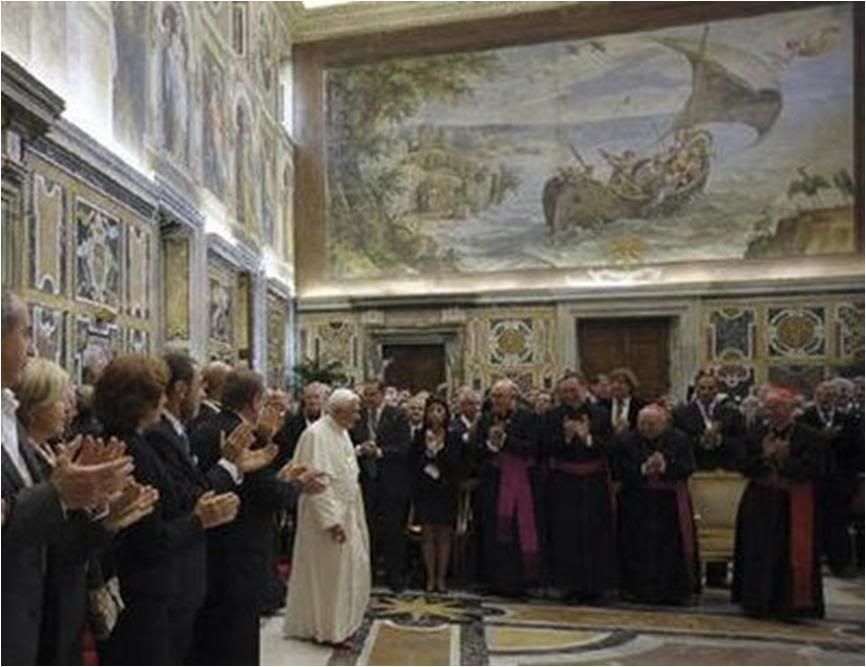
His address yesterday to an International Congress on the ethics of death organized by the Pontifical Academy for Life was the most complete and specific presentation on the subject that any Pope has made.
The Congress theme is a burning issue from the juridical as well as social points of view. The scarcity of donations and the long waiting lists of potential recipients have fueled the phenomenon of a competitive market for hearts, kidneys, corneas and other organs that are now transplantable.
The bishops of Asia and Latin America have repeatedly denounced the risks attendant to their poorest populations who are most vulnerable to the deplorable black market in organs as a way out of crushing poverty.
Organ transplants, the Pope said, represent 'a great conquest for medical science' but organs should always be given freely because "the body cannot be considered an object of trade, otherwise the logic of the market would prevail over everything".
Before more than a hundred doctors and scientists convened in the past few days by Mons. Rino Fisichella, new president of the Pontifical Academy for Life, to reflect on the concept of death and of biological wills, Benedict XVI tackled the subject of organ donation, even to the conflicts within the Catholic Church itself, especially after the publication of an article in L'Osservatore Romano which called for a modification in the s0o-called 'Harvard definition' of death based on neurological criteria, which has been universally accepted as a basis for determining when organ harvest can rightfully proceed.
If this definition is reviewed and current parameters are changed, then cases like Eluana Englaro or Terri Schiavo would be more easily resolved without having to resort to judicial action.
In Church circles, the doctrinal doubt about death defined merely by 'cerebral death' has been making headway in two recent Vatican conferences (2005 and 2006).
"It is useful to remember", Benedict XVI said yesterday, "that single vital organs cannot be taken out except ex cadavere, from a dead person, who nevertheless possesses a dignity which must always be respected."
Further, "In recent years, science has made further progress in ways of ascertaining the death of a patient. It would be good, therefore, if these findings receive the consensus of the entire scientific community in order to favor the search for solutions that will assure certainty [of death] to all concerned."
On such a critical point, the Pope added, "there cannot be the least suspicion of arbitrariness, and where certainty has not been reached, then the principle of caution should prevail."
In effect, he said that the life of the organ donor must remain the only compass, so that taking out organs for transplantation can only be done after real death has occurred.
This is a principle that appears, in black and white, in the Catechism of the Catholic Church, and which John Paul II had cited during a similar audience at the Vatican a few years before his death.
Before delivering that address, the Polish Pope had consulted one of his closest collaborators, then Cardinal Joseph Ratzinger. And what John Paul II said then was the same line about the finis vitae, end of life, that Benedict XVI repeated yesterday, in even more clear and unequivocal terms.
 With respect to Benedict XVI and science, here's a commentary from Avvenire's media watchdog who uses the pseudonym Rosso Malpelo (but also writes regular articles under his true name of Gianni Gennari who married, left the Church, and had second thoughts. Some time ago, I posted a translation of his article on why he thinks the Church position about married priests is justified).
Fanaticism: A word
With respect to Benedict XVI and science, here's a commentary from Avvenire's media watchdog who uses the pseudonym Rosso Malpelo (but also writes regular articles under his true name of Gianni Gennari who married, left the Church, and had second thoughts. Some time ago, I posted a translation of his article on why he thinks the Church position about married priests is justified).
Fanaticism: A word
Italian media has used
to describe others
but not their own
by 'Rosso Malpelo'
Translated from

Nov. 8, 2008
'A pact against fanaticism' is the title given by La Repubblica yesterday for its story on the summit meeting between the Catholic Church and Islam.
All very well, but it raises the question: when can we expect, not in explicit declaration but in deeds, a similar commitment against fanaticism on the part of those who continue to scream, every chance they have, that the Church, the Vatican and the Pope in person are 'on the attack' and continually calling down anathemas on science and its freedom?
Recently (Nov. 2), Enzo Bianchi, prior of Bose, wrote in La Stampa about the recent Synod assembly that "neither the Pope nor the majority of the participating bishops have nostalgia for the past" and that in fact, Benedict XVI "is ahead by far" of most of his bishops in keeping up with the course of history.
And yet, two days later, right when all the newspapers published the photograph of the Pope's affectionate greeting to the astrophysicist Stephen Hawking, one read in Unita [newspaper of the leftist Partito Democrata formed last February to contest the April national elections - losing by a wide margin to Silvio Berlusconi's center-right Voce del Popolo] that "The Pope continually attacks science, and this opens a huge chapter on the hindrances that the Church imposes on scientific research", and from this statement, more on the theme of religion as a plague "imposed on the masses for their social control".
This in the official newspaper of the PD - about which not a single member protested, not one was apparently scandalized by such blatant untruth.
Then there was a report on Paula Binetti, a Catholic politician, who described homosexuality as 'unnatural', adding her own judgment that homosexuality is linked to pedophilia - and there was generalized alarm in the media.
Unita's headline yesterday: "Binetti's case: What should the PD do?", meaning what steps should the party take against her.
So the question is - among such fanatical critics, how is it that no one has ever questioned himself on those 'cases', repeated a thousand times, of deliberate misunderstanding or misrepresentation, or even true and proper calumnies and insults, against the Church, the Pope and Catholics?
True, there is a need for a pact against fanaticism, but it must be against all kinds of fanaticism.
[Modificato da TERESA BENEDETTA 10/11/2008 10:59] |
 09/11/2008 06:19 09/11/2008 06:19 |
|
| | | OFFLINE | Post: 3.414 | Registrato il: 23/11/2005
| Utente Master | |
|
Regarding speculation about a possible papal trip to Burma, this came out a few days ago.
Pope to visit Burma
Monday, November 03, 2008 By UCA News
Pope Benedict XVI says he is ready to make a stopover in Myanmar if he visits another Asian country, Archbishop Charles Maung Bo of Yangon told UCA News in Rome.
Archbishop Bo met the pope privately on Oct. 23.
The previous week, the Salesian prelate, general secretary of the Catholic Bishops' Conference of Myanmar, issued a surprise invitation to Pope Benedict during the archbishop's five-minute intervention at the Synod on the Word of God.
Looking at the pope on Oct. 14, he concluded with the words: "Holy Father, from the time of St. Peter till today, no Holy Father has visited Myanmar. Our warmest welcome to Myanmar!" The synod burst into spontaneous applause when he finished, participants recalled.
Nine days later, Archbishop Bo was in the pope's private library as part of the ad limina visit every bishop is expected to make once in five years to report to the pope and Vatican officials on the situation in his diocese and country.
"The Holy Father at once pointed out that I had invited him to Myanmar during my synod intervention," Archbishop Bo said. During their private conversation, he recalled, Pope Benedict made it clear "he would be ready to make a short visit to Myanmar if he chooses to visit one of the countries in Asia."
The archbishop found the pope's calmness and "clear mind" impressive amid a busy schedule with numerous visitors. The pontiff was interested in the rehabilitation work the Church was involved in after cyclone Nargis, as well as the general situation in Myanmar.
The Yangon archbishop had not been able to join the other bishops from Myanmar when they made their ad limina visits as a group at the end of May, because he was leading the Church relief efforts in the aftermath of the cyclone that he says killed nearly 150,000 people. He estimated Nargis displaced another 2 million people.
Myanmar has a population of 53 million people, 85 percent of whom are Buddhists, 6 percent Christians and 4 percent Muslims. Of the 3 million Christians, about 700,000 are Catholics. The military has been running the country since 1962 and has suppressed pro-democracy movements.
A Vatican official told UCA News, "It should be stated clearly that there is no persecution against Christianity or Catholics in Myanmar." He also pointed out that even though the Holy See and Myanmar do not have diplomatic relations, the Bangkok-based apostolic delegate to Myanmar can freely visit the country and meet bishops, who also are allowed to travel to the Vatican.
A Church source clarified that Myanmar's Catholic Church enjoys freedom to worship but is not allowed to work freely in the fields of education and health care. "Nor can it express its position on sociopolitical questions in accord with the Church's social teaching," the source said in Rome.
Pope Benedict has made 10 foreign trips since his election in April 2005 -- six European countries and Turkey, which straddles Europe and Asia, as well as Australia, Brazil and the United States. At the close of the synod on Oct. 26, he announced a plan to visit the African countries of Angola and Cameroon in March 2009.
Asia, excepting Turkey, is thus the only continent Pope Benedict has not visited or announced plans to visit, but his remark about being ready to visit Myanmar were he to go to another Asian country suggests he is considering this possibility.
Earlier this year, Cardinal Jean Baptiste Pham Minh Man of Ho Chi Minh said he hoped Pope Benedict would visit Vietnam in 2010, for the 350th anniversary of its first two apostolic vicariates and the 50th anniversary of the establishment of the local Church hierarchy.
Like Myanmar, Vietnam does not have diplomatic relations with the Holy See. A Vatican official said this alone does not present a problem. He cited Pope John Paul II's visit to Mexico in 1979, when that country and the Holy See had no diplomatic ties.
According to Vatican diplomatic sources, a papal visit requires an invitation from the local bishops' conference and the national government's invitation or willingness to receive him, since he is a head of state.
 Well, that certainly clears up the FIDES alert. But why did they only put it up now when the UCAN item came out on 11/3? Also, their bulletin head was misleading, since the original UCAN item is entitled "Pope ready to go to Burma", which is what the report says.
Well, that certainly clears up the FIDES alert. But why did they only put it up now when the UCAN item came out on 11/3? Also, their bulletin head was misleading, since the original UCAN item is entitled "Pope ready to go to Burma", which is what the report says.
I do hope Benedict will visit Asia next year. I'm already entertaining visions in my mind of his radiance rivalling the splendor of Rangooon/Yangon's magnificent Shwe Dagon temple complex, the most awesome of all Buddhist temples in active use - perhaps ever. It is literally dazzling - I don't think any other building in the world ever had as much gold leaf on practically every exposed surface, roofs and all, except the floor!
TERESA
[Modificato da TERESA BENEDETTA 09/11/2008 08:19] |
 09/11/2008 13:08 09/11/2008 13:08 |
|
| | | OFFLINE | | Post: 15.613 | Registrato il: 28/08/2005
| Utente Gold | |
|
 An afterthought about the Pope's visit to France and his lecture at the College the Bernardins, from the October issue of Tracce, the monthly organ of Comunione e Liberazione.
The Pope in France:
An afterthought about the Pope's visit to France and his lecture at the College the Bernardins, from the October issue of Tracce, the monthly organ of Comunione e Liberazione.
The Pope in France:
At the heart of culture
by Silvio Guerra
Translated from

October 2008
On September 12, Laurent Laforgue was there, among the 700 'intellos' who came to listen to the Pope at the College des Bernardins. Shortly before that, he had told Tracce what he expected of the papal visit. In this interview, he explains why for him, the occasion was 'a grace'.
Lafforgue is a prominent mathematician (he was the 2002 Fields Medal, the equivalent for mathematicians of getting the Nobel Prize). At 41, he can already boast of a seat in the Academie des Sciences, and on the eve of the Pope's vist, he had spoken up about the Pope's right to speak to the scientific world. Today, he tells us why he has been so struck by the Pope's lecture at Bernardins.
What do you retain of that lecture?
The intelligence and the simplicity of sensible thinking, which goes straight to the heart of essential questions. It's like a benediction. Such teaching can only do good for whoever receives it.
Why is the relationship bteween faith and reason once again at the heart of the question?
The encounter and dialog between faith and reason will always be something actual as long as men live! In our time, such dialog has been and remains decisively conflictual - that is why our societies (as is each of us, basically) are so lacerated.
Like all truly important problems, this one on faith and reason will never be overcome but will demand to be examined in depth infinitely.
The whole discourse at Bernardins centered on the ultimate foundation of any true culture...
And for Bendict XVI, this basis is the search for God and the willingness to listen to him.
At the Invalides Mass, he later said, "Never has God asked man to sacrifice his reason! Never can reason enter into contradiction with faith!" - And because of this, a true culture is possible.
Then at the Tarbes-Lourdes airport, he said: "I maintain that culture and its interpreters are a privileged channel in the dialog between faith and reason, between God and man."
I would be tempted to read it as nothing less than a definition of culture through its most profound raison d'etre: that the ultimate foundation of culture is in being the place for dialog between faith and reason.
In 1980, at the UNESCO, John Paul II said that "the nation exists 'through' culture' and 'for culture'." Thus we can understand the statement cited by Benedict XVI in his address to the bishops of France: that every historical nation incarnates a particular form of dialog between faith and reason, between God and man.
How can this subject help to face the challenge of education today?
To educate, one must first of all have an idea of what is the purpose of man. As the Pope recalled at the Invalides, it is "the happiness of living eternally with God".
At the Bernardins, he showed how the search for God justifies, constructs and orients culture. And he did this in a very concrete way, speaking of grammaer, the profane sciences, schools, libraries, song, music, hermeneutics....
Culture, by definition, is transmitted at the same time as it develops. This transmission of culture is the object of education. The Holy Father's discourse restores to education its ultimate foundation.
The Pope has said that "the roots of European culture are in the search for God". In a secular culture, especially as France has, is that not a discriminatory statement against those who search without necessarily knowing that they are in search of God?
For many decades we have all witnessed the self-destruction of culture and of the school as an institution in the West. This process has been so rapid and radical because the larger part of the representatives of this culture have for some time stoppped believing in it in their deepest being. That is why culture and knowledge (like most other aspects of life) have lost their ultimate foundation.
I don't believe I have ever heard an address better suited to help recover the ultimate foundation of culture, nor words so strong in favor of grammar and letters. Words that the Pope has found in Jean Leclercq: "In Western monasticism, eschatology and grammar are internally connected to each other... The desire for God includes a love for words".
Seculars will argue that grammar and letters can be done without any reference to God...
Yes. But why is it that in the last few decades, the teaching of grammar and letters have deteriorated so much? If they wish to prove that culture and its transmission can be done without God, they should do just one thing: reconstruct a secular culture and a secular school of culture that are worthy of the name. That is a vast program....
The Pope illustrates the truth of what he says with the marvelous quality of his thought and his teaching. It is up to us Catholics to show ourselves worthy of the example which he gives us.
The Pope has said that the Word "introduces us into the communion of those who walk in the faith". Speaking at the Meeting of Rimini in 2007, you spoke of "the communitarian character of the work of mathematicians", united in the search for truth. What does your work have to do with the Pope's appeal?
Mathematicians are oriented to look for truths that do not depend on any of them so that they can all share it - and this creates a communitarian link.
But Benedict XVI is speaking of something even stronger: "The Word that opens the way to the search for God is a Word that concerns the community" and which "makes us aatentive towards each other". In short, it is the Word itself which creates communion. Compared to such a communion, the community of mathematicians, for instance, is a mere image that is necessarily impartial and imperfect.
What struck you most during the visit of Benedict XVI, and what value does it have for the Christian experience?
For me it has meant a lot. Personally, the most important moment was the Mass at Invalides, on the Feast of St. John Chrysostom - called the Eucharistic Doctor. In his homily, the Pope admirably reminded us that the Eucharist is the center of Christian life.
I am convinced that this visit to France will prove to be of great importance to the enitre Church and French society, that it will give lasting fruits.
As a mathematician, what did you think?
To be a Christian mathematician is often uncomfortable. In my field, Christians are rare - an effect of the dramatic historical scission between faith and reason.
For all the others in my field - or almost all - the image of the Church is that which is imposed by the media. They are convinced thhat Catholicism has no intellectual riches - in fact, they do not know anything about it - and so they look down on it.
And the Christian communities that I know are often led not to have any interest in the wealth that is in the tradition of the Church, so that anti-intellectualism has largely taken hold - and this too is an effect of the scission between faith and reason.
As a Christian mathematician, then, I feel alienated both among Christians and among mathematicians. After the Bernardins lecture, however, even my mathematician colleagues - despite their prejudices - had to acknowledge that with Benedict XVI, they are dealing with a great mind which at the very least deserves to be taken into consideration. Likewise, the Christian communities saw an extraordinary example of intelligence placed at the service of the Church with simplicity and humility. And all this fills me with joy.
[Modificato da TERESA BENEDETTA 11/11/2008 03:52] |
 09/11/2008 13:38 09/11/2008 13:38 |
|
| | | OFFLINE | | Post: 15.614 | Registrato il: 28/08/2005
| Utente Gold | |
|

OR today - as previewed yesterday.
 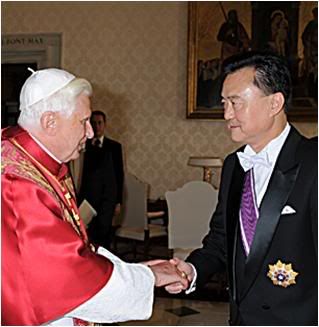
Benedict XVI to the participants of an international symposium:
'An inestimable teaching: the Magisterium of Pius XII'
Other stories on Page 1: The Holy Fahter receives the new ambassador from Taiwan (right photo); and an editorial commentary that 'finacne fails without ethics'.
THE POPE'S DAY
Angelus today.
|
 09/11/2008 14:37 09/11/2008 14:37 |
|
| | | OFFLINE | | Post: 15.615 | Registrato il: 28/08/2005
| Utente Gold | |
|
 ANGELUS TODAY
ANGELUS TODAY
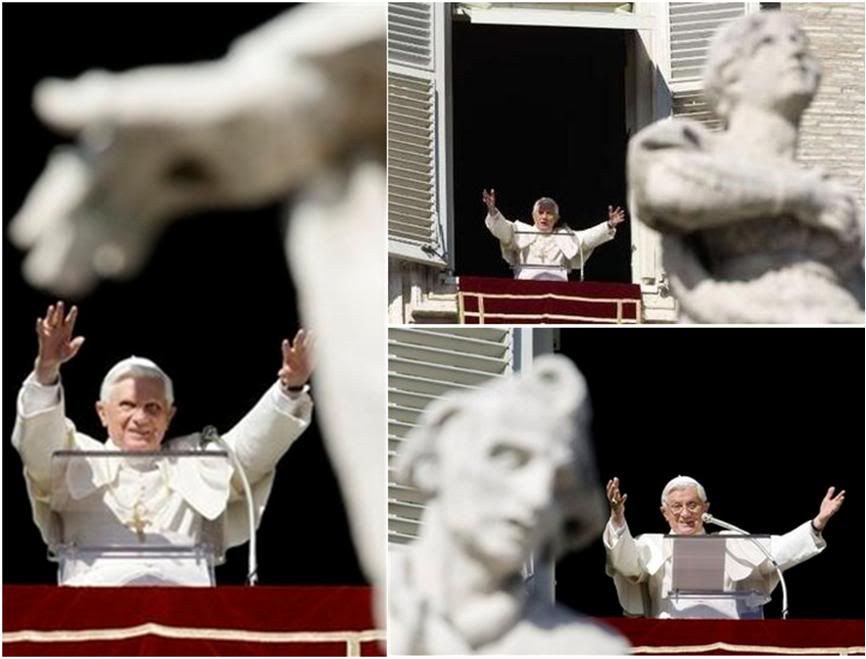
In his pre-Angelus mini-homily today, Pope Benedict XVI spoke of the significance of the feast of the dedication of the Basilica of St. John Lateran today.
After the prayers, he recalled the 70th anniversary today of Kristallnacht when the Nazis attacked Jews and their houses, businesses and synagogues, and said he prayed that everyone can commit themselves against anti-Semitism and all forms of discrimination.
He also recalled the 90th anniversary of the end of the First World War; called for an end to the conflict that has victimized a million and half refugees in the North Kivu region of the Congo; and said that on Thanksgiving Day in Italy today, the Church calls attention to growing hunger in the world.
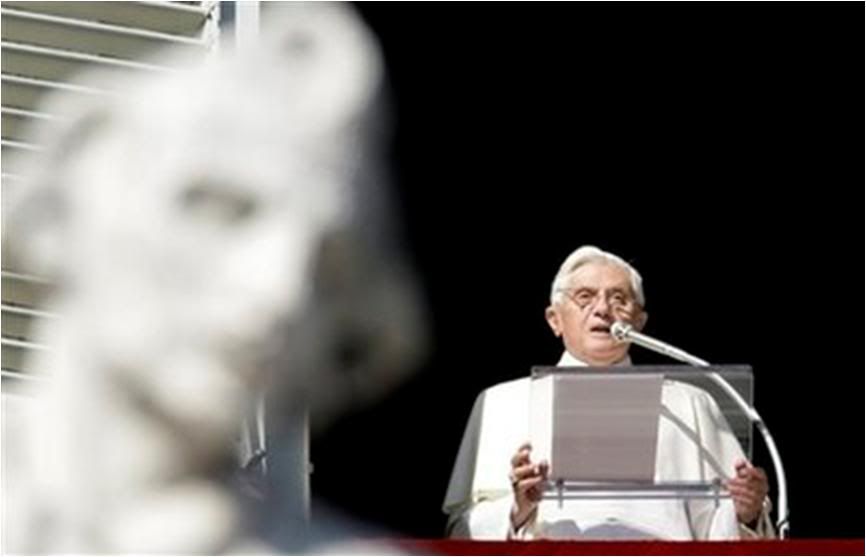 Here is a full translation of the Holy Father's words at the noontime Angelus today.
Here is a full translation of the Holy Father's words at the noontime Angelus today.
Dear brothers and sisters!
The liturgy today celebrates the dedication of the Lateran Basilica, called the "the mother and chief of all the churches of the Urbe (city) and the Orbe (world)".
Indeed, this Basilica was the first church built after the edict of Emperor Constantine in 313 which granted Christians the freedom to practise their religion. The emperor himself gave Pope Melchiades a property of the Lateran family, where he had constructed the Basilica, the Baptistery and the Patriarchy, that is, the residence of the Bishop of Rome, where the Popes lived until the Avignon exile.
The dedication of the Basilica was celebrated by Pope Sylvester around 324, and the temple was named for the Most Holy Redeemer. The titles of Saints John the Baptist and John the Evangelist, from which the church gets its familiar name, were added only after the 6th century.
This feast at first was of interest only to the city of Rome, but since 1565, it has been extended to all the Churches following the Roman rite. In honoring the sacred edifice, it is intended to express love and veneration for the Roman Church which, as St. Ignatius of Antioch said, 'presides in charity' over the entire Catholic communion (To the Romans, 1,1).
The Word of God on this solemnity recalls an essential truth: that the temple of bricks is a symbol of the living Church, the Christian community, which, already in their letters, the Apostles Peter and Paul understood as a 'spiritual edifice', constructed by God with the 'living stones' that Christians are, on the one foundation of Jesus Christ, compared in turn to the 'cornerstone' (cfr 1 Cor 3,9-11.16-17; 1 Pt 2,4-8, Eph 2,20-22).
"Brothers, you are God's building", St. Paul writes, and adds: "The temple of God, which you are, is holy" (1 Cor 3,9c.17).
The beauty and harmony of churches, destined to render praise to God, invites even us humans, with our limitations and sins, to convert ourselves in order to form a 'cosmos', a well-ordered construction, in close communion with Jesus, who is the true Saint of Saints.
This culminates in the Eucharistic liturgy, during which the 'ekklesia' - the community of baptized persons - are gathered to listen to the Word of God and to nourish themselves with the Body and Blood of Christ.
Around this double meal, the Church of living stones is edified in truth and charity, and becomes interiorly shaped by the Holy Spirit, becoming transformed into one that receives, conforming itself ever closer to its Lord Jesus Christ. The Church itself, if it lives in sincere and fraternal unity, thus becomes a spiritual sacrifice that is pleasing to God.
Dear friends, today's feast celebrates a mystery that is always actual: namely, that God wishes to build in the world a spiritual temple, a community that adores him in spirit and in truth (cfr Jn 4,23-24).
But this occasion also reminds us of the importance of the material edifices in which communities gather to celebrate the praises of God. Every community therefore has the duty to take good care of their own sacred edifices, which constitute a precious religious and historical patrimony.
Let us now invoke the intercession of the Most Blessed Mary so that she may aid us to become, like herself, the 'house of God', a living temple of his love.
After the Angelus, he had these special messages:
Today is the 70th anniversary of the tragic event [Kristallnacht - the night of glass-smashing] which took place on the night of November 9-10, 1938, when Nazi fury against the Jews was unleashed in Germany.
Businesses, offices, houses and synagogues were attacked and destroyed, and many persons were killed, opening the way to the systematic and violent persecution of German Jews which ended in the Shoah (Holocaust).
Even today I feel pain over what happened on that tragic occasion, the memory of which should serve to ensure that similar horrors are never repeated again, and that we should commit ourselves, at all levels, against every form of anti-Semitism and discrimination, educating above all the young generations in respect and reciprocal acceptance.
I invite you to pray for the victims then and to join me in showing profound solidarity with the Jewish world.
Disquieting news continues to come from the North Kivu region of the Democratic Republic of the Congo. Bloody armed encounters and systematic atrocities have resulted and continue to result in numerous victims among innocent civilians.
Destruction, sacking and violence of every kind have forced tens of thousands of persons to abandon even the little that they have in order to survive. It is estimated that there are now more than a million and a half refugees.
To all and to each of them, I wish to express my particular closeness, as I encourage and bless all those who are doing their best to relieve their sufferings, among which I must mention in particular, the pastors of the local Churches.
To the families who have lost loved ones, I extend my condolence and assure them of my prayers for the departed. Finally, I renew my fervent appeal so that everyone may work together to restore peace in that land that has been tormented for so long, with respect for the law and, above all, for the dignity of every human being.
Italy today marks Thanksgiving Day which this year is on the theme, "I was hungry and you fed me'. I join my voice to that of the Italian bishops who, with those words of Jesus, call attention to the serious and complex problem of hunger today, made more tragic by the rise in the cost of some basic foods.
The Church, even as it re-proposes the fundamental ethical principle that the goods of the earth have a universal destination [meant for everyone], puts this into practice, following the example of Jesus, with multiple initiatives of material sharing.
I pray for the rural world, especially the small farmers in the developing countries. I encourage and bless all who are committed to the task of seeing to it that no one lacks healthy and adequate alimentation. Whoever helps the poor helps Christ himself.
In his message to the French-speaking faithful, he said:
Let us pray to God, in these days that commemorate the 90th anniversary of the end of the First World War, for peace in the world and for all those who work for justice and brotherhood among men.
To German-speaking pilgrims, he repeated his remembrance of Kristallnacht, adding:
In memory of the victims, let us pray to the Lord for his assistance, so that we can work together in building a society in which men of different religions and races can live together in peace and justice.
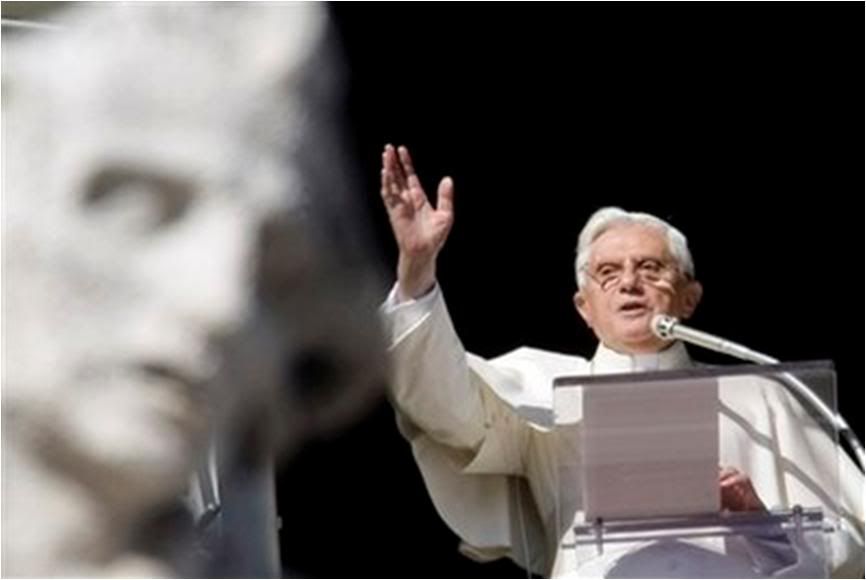 Pope speaks of 'pain'
Pope speaks of 'pain'
in remembering Kristallnacht

VATICAN CITY, Nov. 9 (AFP) – Pope Benedict XVI marked on Sunday the 70th anniversary of the Kristallnacht pogrom -- a prelude to the Holocaust -- by recalling the agony he felt as a boy growing up in Nazi Germany.
An unwilling member of the Hitler Youth who deserted the German army towards the end of World War II, the leader of the world's Roman Catholics, urged younger generations to shun all forms of discrimination.
Recalling the "sad events of the night of 9-10 November 1938, when the Nazi fury was unleashed against the Jews," the 81-year-old Pope said "even today, I feel pain for what happened in these tragic circumstances, of which the memory must serve to ensure that such horrors never occur again.
"Shops, offices, homes and synagogues were attacked and destroyed, and numerous people were killed, acting as the trigger for the systematic and violent persecution of German Jews which resulted in the Shoah," the Hebrew name for the Holocaust.
Benedict called on the world to "act, at every level, against all forms of anti-Semitism and discrimination, educating the younger generations in particular about the meaning of reciprocal respect."
He called on tens of thousands of pilgrims to "pray for the victims of yesteryear" and to "unite" in showing the Roman Catholic faith's "profound solidarity with the Jewish world."
The pogrom, also known as the Night of Broken Glass, saw Nazi thugs plunder Jewish businesses throughout Germany, torch some 300 synagogues and round up some 30,000 Jewish men for deportation to concentration camps.
Some 90 Jews were murdered in the orgy of violence.
The Pope last month backed the beatification of his controversial World War II predecessor Pius XII defending the wartime Pontiff's actions during a "complex historical moment."
His stance has sparked bitter debate and tension between Catholics and Jews. [Excuse me! I think the bitterness is mostly on the part of those Jews who have somehow latched on to Pius XII as their scapegoat for the Holocaust. To read their comments, one would think the Pope alone was responsible for the Shoah, and that he is more despicable than Hitler himself. Offended Catholics are not bitter - we're just outraged, and not feeling too indulgent about this one-sided condemnation of Pius XII by people who refuse to consider any evidence that does not reinforce their prejudice. ]
Rabbi welcomes Pope's words
about Kristallnacht
Translated from

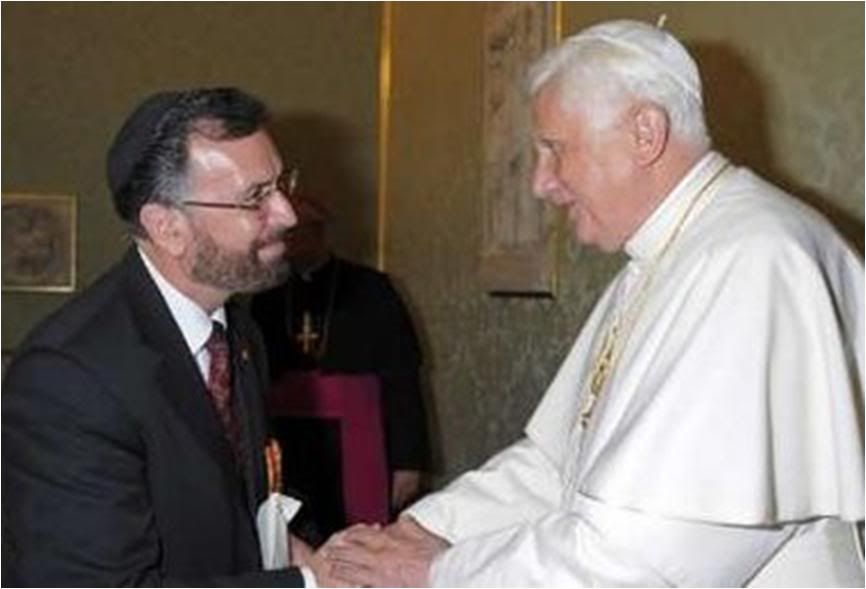
ROME, Nov. 9 (Translated from Apcom) - Ten days ago, Rabbi David Rosen was at the Vatican and asked Pope Benedict XVI to open the Vatican Archives on Pius XII, and later said he was 'disappointed' when the head of the Archives explained that this could not be done earlier than 6-7 years from now because the material is still being catalogued, digitized and organized.
Today in Budapest, Rosen welcomed Pope Benedict's words at Angelus today, remembering 'with pain' the 70h anniversary of Kristallnacht, when the Nazis first unleashed their fury publicly against German Jews, were 'very important' for Jewish-Catholic relations.
Rosen, who is president of the Jewish Committee for Inter-Religious Consultations, is in Budapest to attend a meeting between a Vatican panel headed by Cardinal Walter Kasper, president of the Vatican Commission for Religious Relations with the Jews, and the Grand Rabbinate of Israel.
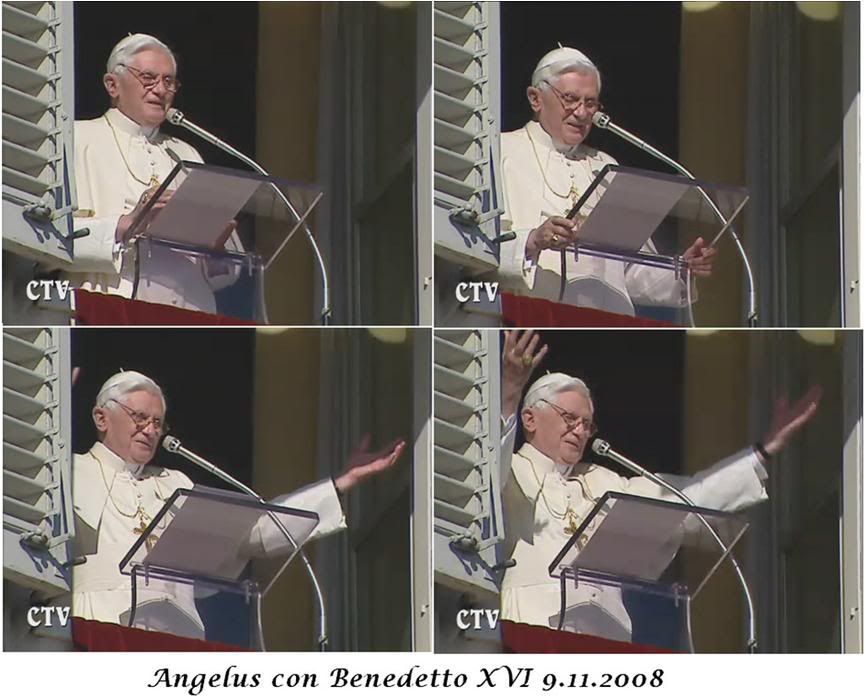 Thanks to Caterina: Part of her videocap montage from today's Angelus.
Thanks to Caterina: Part of her videocap montage from today's Angelus.
"Benedict XVI is a very consistent man," Rosen said. "The position he stated is very important."
[Being consistent, the Pope only said what he has said many times in the past about anti-Semitism. What else can one say about it anyway, except 'never again!
So it wasn't what he said that was newsworthy, I think, but that he chose to remember Kristallnacht 'in public', giving it priority importance in his supplementary Angelus messages, over the simultaneous 90th anniversary of the end of World War I. Would a non-German Pope have considered it the same way? I have to check back if John Paul II used the 50th anniversary of Kristallnacht in 1988 for a similar purpose.]
"He presents Nazism not just as a sin, as John Paul II did, but also as an attack against the very roots of Christianity itself," Rosen said.
He likes Benedict's formulation expressed on earlier occasions [most recently in Paris] that one cannot be a Christian and anti-Semitic at the same time.
Rosen was asked whether the Pope's words would help relationships between Jews and Catholics in the light of a new wave of polemics over Pius XII.
"Of course, it helps," he said. The work on historical memory will always be complicated between Jews and Catholics, and there will always be moments of tension, but these are disturbances within a relationship that is indisputably positive and constructive, and a partnership even that looks to the future."
He said proof of this was the bilateral meeting in Budapest, and that in fact, both delegations were planning a joint observance of the Kristallnacht anniversary later.
"The important fact," he said, "is what John Paul II said, which Benedict XVI has reiterated: we are working not just to repair the past but to learn from the past. Past tragedy is an educational tool for the future."
Rosen was asked to comment on Cardinal Bertone's statement Thursday that beatification was a religious matter internal to the Catholic Church, over which the Vatican has exclusive competence.
"Obviously," Rosen answered, "but if the Catholic Church says it wants a positive and respectful relationship with the Jews, then it is reasonable to expect that it will consider Jewish sensibility on the matter."
[It does and it will, but that does not mean the Church will allow uninformed or willfully misinformed Jewish sensibility to dictate what it will do about a Pope who is widely acknowledged to have been, at the very least, an extraordinary person and Pope.
If Pius XII ever becomes a Blessed One or a Saint, this concerns Catholics alone - the Church does not ask non-Catholics to venerate its saints, or to agree with who it considers saints: if others agree and/or venerate them, fine; if not, it takes nothing away from the Blessed One or Saint, or from the Catholic faith.]
As for Pope Benedict's denunciation yesterday of 'unilateral' interpretations of Pius XII's wartime actions, Rosen said, "There are certainly subjective interpretations on both sides about Pius XII".
[Of course. But the Church has the weight of historical evidence as objective fact to support its 'subjective' view of Pius XII, whereas his Jewish critics persist in ignoring all the positive evidence - testified to by their own people, including prominent Jews, at or near the time of the events in question - to concentrate on what he failed to do. The other thing is that in Rome, Rosen was quoted to have told a news conference that he asked for the opening of the archives on Pius XII, but not for the suspension of the beatification process because he personally did not share this demand.]
* * * * * * * * * * * * * * * * * * * * * * * * * * * * * * * * * * * * * * * * * * * * * * * * * * * * * * * * * * * * *
I've now read some 10-12 diffeent reports and commentary in the Italian press about the Holy Father's speech on Pius XII last Friday and not one of them picked up his reference to Pius XII as the 'immortal Pontiff' - so much so that I started to doubt my own memory and went back to the original text - and yes, the last clause of his last sentence about Pius XII, which starts with the phrase that calls him 'an exceptional gift from God', reads thus:
... auspico che si continui a riflettere sulla preziosa eredità lasciata alla Chiesa dall’immortale Pontefice, per trarne proficue applicazioni alle problematiche oggi emergenti.
Translation:
...I wish continued reflection on the precious legacy left to the Church by this immortal Pope, so that we may draw profitable applications to the problems that emerge today.
I was so struck at the time by his use of the word 'immmortal' that I commented on it. And yet, everyone else appears to be ignoring it, and I cannot figure out why.
Are they 'embarassed' that Benedict XVI would, so to speak, 'go out on a limb' like that about a Pope whose judgment and courage, at the very least, are contested by many, including some Catholics - and so, in their way, they are trying to 'protect' him from undue exposure to his critics? But anyone can read the full text online!
Interesting (and unnecessarily provocative) that one of the Italian reports claims that Mons. Sergio Pagano, head of the Vatican Archives, told the Jerusalem Post recently that he, too, thinks, the Church should suspend the beatification process on Pius XII until the archives of his Pontificate are made public.
Rather out of turn, I thought. Pius XII's Jewish critics could now use that statement to say, "Ah-ha! If even the head of the Vatican Archives thinks that, then he must be aware there is damaging material in there." Even if it could easily mean the opposite - that he knows the material will not turn up a smoking gun. Or even more simply, that he does not know what specific material there may be relative to this question but that he personally shares putting Pius XIXI's cause on hold.
[Modificato da TERESA BENEDETTA 10/11/2008 11:33] |
 10/11/2008 02:49 10/11/2008 02:49 |
|
| | | OFFLINE | | Post: 15.623 | Registrato il: 28/08/2005
| Utente Gold | |
|
 Benedict XVI set to sign
Benedict XVI set to sign
Pius XII decree?
Israel reportedly warns the Vatican it will be unable to control Jewish reaction
if the Pope allows the beatification process to continue
by Lucio Brunelli
Translated from

November 9, 2008
In the past few days, the Israeli ambassador is said to have brought a disquieting message to the Vatican: that if the Pope proceeds with the beatification of Pius XII, the Jewish world could manifest 'visceral reactions which the state of Israel will not be able to control".
[And what might those visceral reactions be? Angry Jews will demonstrate and riot and burn the Pope in effigy as the Muslims did reacting to a misrepresentation of the Regensburg lecture? Storm the Nunciatures around the world and set fire to them? Sack and pillage Catholic churches like terrorists do in Iraq? Attack and kill Christians and rape their women as the Hindus are doing in India? Do to Catholics what the Nazis did to Jews?
Does Judaism really sanction this kind of relentless and irrational hatred that feeds on sheer prejudice and raw emotion, that prefers to believe only the worst of a man, whom their most respected leaders and representatives praised contemporaneously for the very opposite of what they are making him out to be in hindsight - long before this vicious wave of hate bigotry engulfed the most gullible among them?]
After the public declarations of Minister Herzog against Pius XII, the warning from the ambassador understandably has soured some moods at the Vatican. Which has meanwhile stepped up its praise of the wartime Pope, his person, his actions during the war, and his Pontificate.
And Cardinal Bertone declared bluntly last Thursday in a long speech about Pius XII's career before he became Pope: "The cause for Pius XII's beatification is a religious event, over which the Holy See has the exclusive competence."
And yesterday, Benedict XVI himself gave his second address in four weeks in praise of Papa Pacelli, calling him 'a gift of God' to the Church and to mankind, and describing criticisms of his wartime actions as 'unilateral'. [Strange that I have not seen anyone pick up the line where he calls him 'immortal'!]
In effect, the pressures being exerted by official representatives of the Israeli government appear to be undue interference in the internal working of the Catholic Church - creating the opposite effect on the Pope's closest collaborators.
Well-informed sources said Benedict XVI had already decided - before this recent new wave of protests - to sign the decree on Pius XII's heroic virtues by December. And that recent warnings by Jewish critics are not going to impede it.
However, it is time to make two things clear to the protesters.
First, the Pope's signing the decree does not automatically lead to beatification. It just allows the next step to happen. There are hundreds of causes sitting in the Congregation for the Cause of Sainthood that have been stuck at this stage for years, even decades.
To merit the title of Blessed, a candidate whose 'heroic virtues' have been recognized must next go through the most rigorous examination of everything he ever did and said - good and bad - through eyewitness testimony and all available documentation, first at diocesan level, and later at the Curial level.
[I've kept pointing out that Pius XII's critics should prepare to present their strongest case against him at this stage - that this is the appropriate platform for their protests, not telling the Pope to suspend the beatification process, because they have no say in that matter. Once the process is underway, then the mechanism allows opponents of the candidate's cause to present their case, resorting to a devil's advocate if they have to, in order to insure the integrity of the process...
But the problem with bigoted critics, of course, is that they often do not even stop to examine facts before shooting from the hip and generally charging about madly like bulls rampaging in 'roid rage through a china shop!]
More important, even if the candidate passes this through examination, there must be at least one miracle declared unexplainable by medical experts and appropriately assessed by theologians.
It also helps if the candidate has a reputation for sanctity upheld by popular devotion.
In the case of Pius XII, there has so far been no news about any miracles attributed to him, nor evidence of a persistent popular devotion.
So, Papa Pacelli's heroic virtues may be solemnly recognized the Church, but that does not automatically bring him 'the honors of the altar'.
This derives from the internal logic of the Church's canonization process - independent of the historical controversies and political conditioning that surround this particular cause.
The second cause of confusion for non-Catholics is equating any judgment on the sanctity of Pius XII with the judgment of historians about his actions as Pope. They are not identical.
It can be argued that Pius XII did do all he could as Pope to help save the Jews in the second World War, but that does not automatically qualify him to be venerated as a saint.
Vice-versa, the Church may find him worthy of being declared a saint after all the steps of the process have been satisfagtorily fulfilled - saints are not necessarily heroes in the secular sense - while leaving open the historical question of whether he chose right to be prudent during World War II rather than make a public show of denouncing the Nazis.
Certainly, however, it is sacrosanct to counteract the unjust [and uninformed, I would add] accusations made against Pius XII - that he failed to act out of fear, or worse, that he was complicit with the Nazis.
Because it is a fact that no other civilian or religious institution saved as many Jewish lives in World War II as did the Catholic Church.
Why do the Pope's Jewish critics, for instance, ignore the testimony made several times over by the former Chief Rabbi of Rome, Elio Toaff [who became John Paul II's good friend], who himself had relatives saved by priests and eventually, he himself was able to elude Nazi schemes to get him thanks to the assistance of a priest.
[The sad fact is that Pius XII's Jewish critics are playing a variation of the Three Monkeys - they refuse to see or hear any good about their target, because they don't want to speak any good about him.]
|
 10/11/2008 19:23 10/11/2008 19:23 |
|
| | | OFFLINE | Post: 1.628 | Registrato il: 27/11/2005
| Utente Veteran | |
|
Hey! I'm going to lure Papa to Britain!!!!!! From the Daily Telegraph:
Hope that Pope Benedict may be lured to Britain
Pope Benedict XVI does not share his predecessor's wanderlust, but senior Roman Catholics hope that he can still soon be lured to this country.
Richard Eden
Last Updated: 5:08PM GMT 08 Nov 2008
One prominent clergyman tells Mandrake that there are discussions afoot about the 81-year-old Pontiff visiting Britain for the beatification of Cardinal Newman, which is likely to be announced in the next few months. "He has a great devotion to Newman," says my informant.
A spokesman for Cardinal Cormac Murphy-O'Connor, the Archbishop of Westminster, says a visit would be "welcomed by both the bishops and all the faithful".
Aware of the Vatican's distaste for presumption, he is, however, keen to stress that the cardinal is working on the assumption that the Pope would
not attend the ceremony, which would be the first step towards Cardinal Newman becoming a saint. "It is normal practice for the Pope to appoint a senior prelate to preside," he says.
Well, my maiden name was Newman, so, who knows, there could be some connection with Cardinal Newman, in which case I'm bound to be invited to the Beatification Mass!!!!!!
![[SM=g27824]](https://im0.freeforumzone.it/up/0/24/6594288.gif) ![[SM=g27824]](https://im0.freeforumzone.it/up/0/24/6594288.gif) ![[SM=g27824]](https://im0.freeforumzone.it/up/0/24/6594288.gif) ![[SM=g27824]](https://im0.freeforumzone.it/up/0/24/6594288.gif) ![[SM=g27824]](https://im0.freeforumzone.it/up/0/24/6594288.gif) ![[SM=g27824]](https://im0.freeforumzone.it/up/0/24/6594288.gif)
|
 10/11/2008 23:27 10/11/2008 23:27 |
|
| | | OFFLINE | | Post: 15.626 | Registrato il: 28/08/2005
| Utente Gold | |
|

OR for 11/10-11/11:
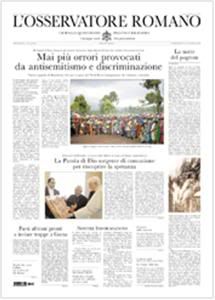 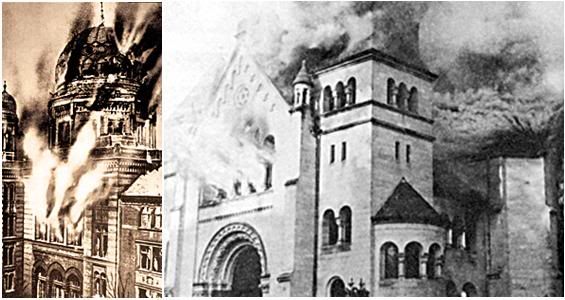
The three-level banner headline tries to cover the main messages of the Holy Father after the Angelus prayer on Sunday,
starting with his lament over rising food prices resulting in tragic famine among the poorest nations, and his appeal
for peace in the Congo's North Kivu, but focusing on his words to mark the 70th anniversary of Kristallnacht,
the event that marked Nazi Germany's open persecution of the Jews (photos show two synagogues burned that night):
'Never again horrors provoked by anti-Semitism and discrimination'
There is a featured editorial commentary on what Germans now call Pogromnacht instead of Kristallnacht, by Jewish writer Anna Foa,
and a longer inside story on the historical facts about the event. Other Page 1 stories: the Holy Father's address to Bolvian bishops
on ad-limina visit (photo below); and two Italian nuns kidnapped in Kenya and taken to Somalia.
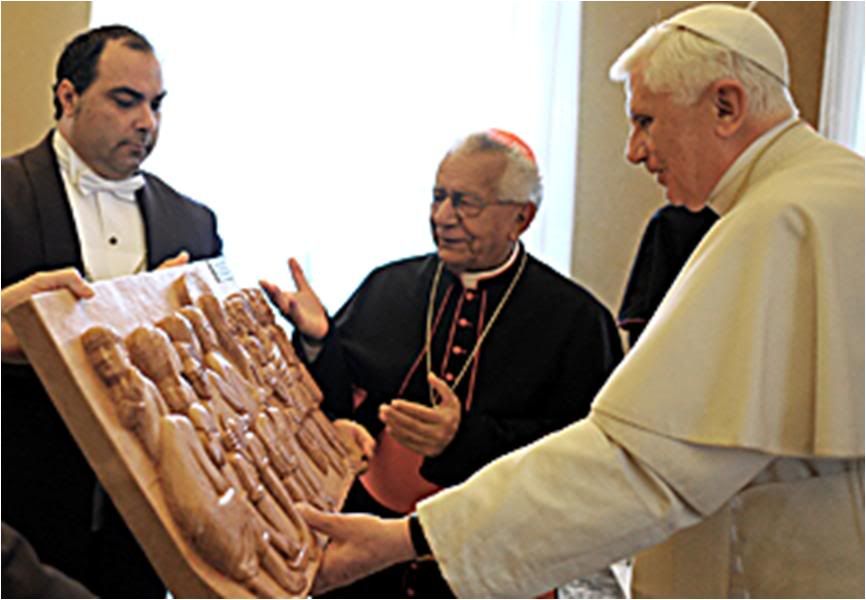 THE POPE'S DAY, 11/10/08
THE POPE'S DAY, 11/10/08
The Holy Father met with
- Bishops of Bolivia on ad-limina visit. Address in Spanish.
Later, he was given a private screening of a new RAI television film on Paul VI.
TO THE BISHOPS OF BOLIVIA:
MAINTAIN HOPE AND PROMOTE UNITY

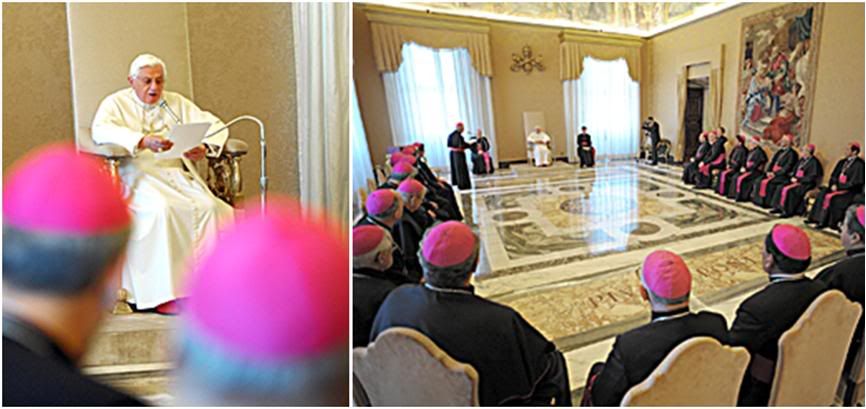
VATICAN CITY, 10 NOV 2008 (VIS) - Benedict XVI today received prelates from the Bolivian Episcopal Conference, who have just completed their "ad limina" visit.
At the beginning of his address to them, the Pope referred to "the difficult circumstances affecting the faithful and citizens" of the country, "which at the current time seem to be becoming even more marked. These certainly cause concern and call for the special pastoral solicitude of the entire Church, which has closely followed Bolivians through difficult situations with the single intention of keeping hope alive, reviving faith, fomenting unity, exhorting reconciliation and safeguarding peace".
"Nor is there a lack of challenges in your pastoral duties, because the faith sown in Bolivian soil always needs to be nourished and fortified, especially when signs emerge of a certain weakness in Christian life". Such weakness can be "caused by factors of various origins, by incoherence between professed faith and the conduct of personal and social life, or by a superficial formation which leaves the baptised exposed to the influence of dazzling but empty promises".
In order to face these challenges, said the Holy Father, "the Church in Bolivia has one powerful means at her disposal in the form of popular devotion, a valuable treasure accumulated over the centuries thanks to the work of intrepid missionaries, and upheld with great faithfulness by generations of Bolivian families.
"It is a gift which certainly has to be safeguarded and promoted today, ... so that its significance may penetrate into the depths of people's hearts, remain illuminated by the Word of God, and transform itself into firm convictions of faith, consolidated by the Sacraments and by faithfulness to moral values".
To this end, the Pope went on, "systematic, widespread and incisive catechesis is needed, catechesis that teaches the Catholic faith clearly and completely. ... Quality general education, which includes the spiritual and religious dimension of the person, also helps to lay firm foundations for the development of the faith".
In this context he recalled how the Church in Bolivia runs many educational institutions, "some highly prestigious, which must continue to enjoy the attention of pastors so as to maintain respect for their particular identity".
Benedict XVI expressed his appreciation for the prelates' efforts "to offer seminarians a solid human, spiritual, intellectual and pastoral formation, ensuring them the attentions of priests able to accompany them in their vocational discernment and to guarantee their suitability and competency.
It is also necessary", he went on, "to ensure a permanent formation of the clergy and other pastoral workers, in order to nourish their spiritual life and to ensure their work does not become routine or superficial".
Referring then to the importance of listening to and meditating upon Scripture, the Pope highlighted how "docile listening to the divine Word gives rise to love for others and ... disinterested service to mankind. This is something that occupies a very important position in pastoral activity in Bolivia, in the face of the poverty, marginalisation and helplessness of a large part of the population".
The Holy Father concluded by encouraging bishops in their mission "as guides of the Church in Bolivia, and in the spirit of communion and harmony they share". This communion is "enriched with special bonds of close fraternity with other particular Churches, some of which are in distant lands but wish to share with you the joys and hopes of evangelisation in your country".
TEACHING MEMORY
FOR A EUROPE OF FREEDOM

VATICAN CITY, 10 NOV 2008 (VIS) - On November 6, Archbishop Jean-Louis Brugues O.P., secretary of the Congregation for Catholic Education, participated as Holy See representative to the Council of Europe's fourth seminar of ministers of education of States signatories to the European Cultural Convention.
The meeting had as its theme "teaching memory: living in a Europe of freedom and law" and took place in the German city of Nuremberg-Dachau from 5 to 7 November.
The archbishop indicated how the site chosen for the meeting is replete with memories that have marked European history: "the great Nazi rallies, but also the trials of those who committed serious crimes against humanity. The events this city witnessed speak to us of the drama of an age in which freedom and justice were denied and the dignity of man was trampled underfoot.
"Recalling the drama of the victims and paying homage to their memory", he added, "invites everyone to become aware that those dark events are a call to construct the present and future of our continent so that such tragedies are never repeated, either in Europe or anywhere in the world. On this subject, the Holy See appreciates the commitment of States signatories to the European Cultural Convention to ensure that, by teaching memory, a contribution may be made not only to knowledge of the past, but also to mutual understanding, to dialogue, to prevention of crimes against humanity, and to consolidating a Europe of freedom and law.
"Law and freedom are essential if we are to avoid relapses into totalitarianism". Law, however, must be "based on an exalted sense of dignity and justice. ... We risk falling once again into barbarism if we do not have a passion for justice and freedom and if we do not undertake, each in accordance with his or her abilities, to ensure that evil does not prevail over good, as happened for millions of children of the Jewish people".
Archbishop Brugues went on to say that "we must redouble our efforts to free mankind from the spectres of racism, exclusion, marginalisation, subjection and xenophobia, also extirpating the roots of these evils which insinuate themselves into modern society and undermine the foundations of peaceful human coexistence".
"The duty of memory must thus continue to move our hearts and minds, bringing reason to recognise evil and reject it, to arouse in us the courage of goodness and of resistance to evil . ... Passing time brings the progressive loss of firsthand witnesses of that tragedy. This must incite us to greater efforts in order to conserve the memory and transmit it to new generations. We must, then, encourage such initiatives as the 'Day of memory and of the prevention of crimes against humanity', which contribute to keeping the memory of those tragic events alive".
[Modificato da TERESA BENEDETTA 10/11/2008 23:53] |
 11/11/2008 00:30 11/11/2008 00:30 |
|
| | | OFFLINE | | Post: 15.627 | Registrato il: 28/08/2005
| Utente Gold | |
|
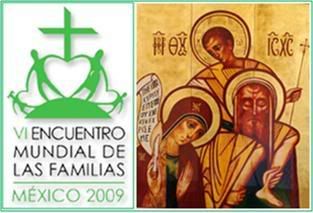 Cardinal assures Mexico
Cardinal assures Mexico
Pope's absence at Family Encounter
is not a snub
By ALEXANDRA OLSON

MEXICO CITY, Nov. 10 (AP) – A Vatican envoy tried to reassure disillusioned Mexicans on Sunday that Pope Benedict XVI was not snubbing the deeply Roman Catholic country with his decision not to attend an event here next year.
The Vatican says the Pope declined an invitation to attend World Family Day in January because Mexico City sits too high above sea level for someone his age — 81. [Not just his age but more decisively, his medical condition - he has a history of cardiovascular problems.]
Mexico City is more than 2,200 meters (7,300 feet) above sea level.
But the Pope is sending his top aide, Secretary of State Cardinal Tarcisio Bertone, to stress the importance he places on the event and his affection for Mexico, said Cardinal Ennio Antonelli, president of the Pontifical Council for the Family, who was visiting to help with preparations for the gathering.
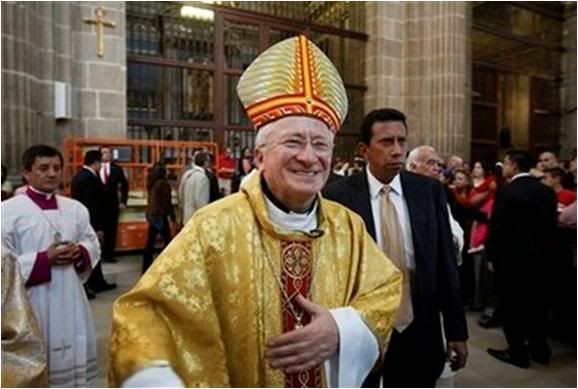 Cardinal Antonelli arrives at Mexico's Cathedral for Mass yesterday.
Cardinal Antonelli arrives at Mexico's Cathedral for Mass yesterday.
"My impression is ... that the Pope was disposed to come. But he must listen to the people around him who worry about his health," said Antonelli, speaking through a translator said at a news conference.
Antonelli acknowledged that "the Pope's presence would have attracted more people to the event." But he noted that it would draw bishops and cardinals from around the world and that Benedict would give a recorded message.
The Vatican's explanation for the Benedict's absence has left some Mexicans cold, particularly because his predecessor, the globe-trotting Pope John Paul II, was frail and 82 when he last traveled to Mexico City in July 2002.
John Paul had a special bond with Mexico. He chose the country for the first foreign trip of his papacy in 1979 and visited four more times, drawing wildly enthusiastic crowds.
"Pope John Paul was older and still he came to visit. This Pope is younger and he's not coming," said Emma Ruiz Estrada, a housewife leaving Mexico City's Metropolitan Cathedral cradling her recently baptized grandson. [They saw John Paul five times - that's good for five lifetimes for the majority of Catholics who have little or no chance to see a Pope.]
"It seems like the affection is not there," she said of Benedict. "There will never be two John Pauls."
[What a horribly selfish attitude! As if the Pope only exists to indulge people who want to see him. And how thoughtless of the reporter to report it - I am almost sure she solicited the remark.]
With 10 foreign pilgrimages since assuming the papacy in 2005, Benedict has kept pace with the John Paul, who was only 58 when he became Pope.
But unlike his predecessor, Benedict has traveled little to the developing world. He has instead toured extensively in the West, where he says the church is in "crisis."
{What silly statements! He has made 10 trips all of which were for special occasions - almost duty trips - which happened to be in Western countries.
'Toured extensively in the West'? His trips are hardly 'tours'; so far, he has visited one country at a time, where John Paul II used to go to as many as 6 in one single trip. And what is extensive about the handful of duty trips he has done so far? And why no mention that he is travelling to Africa in March? Is that not 'the developing world'? Wasn't Brazil?
One would have thought journalists would at least credit Benedict for prudence in managing his time and energies, given his age. Besides, he made it clear from the start that he would not be able to travel as much as his predecessor. To each his own charism, as the OR motto has it, Unicuique suum.]
[Modificato da TERESA BENEDETTA 11/11/2008 00:35] |
|
|
|
|